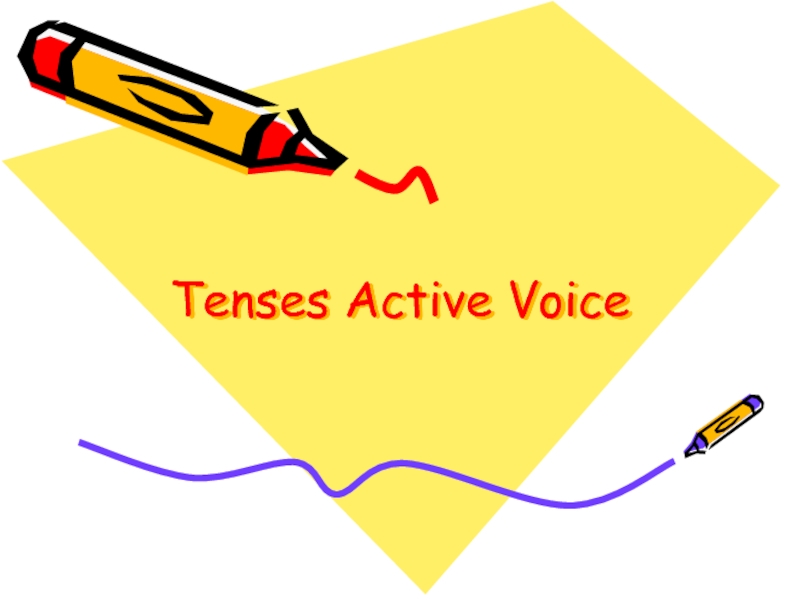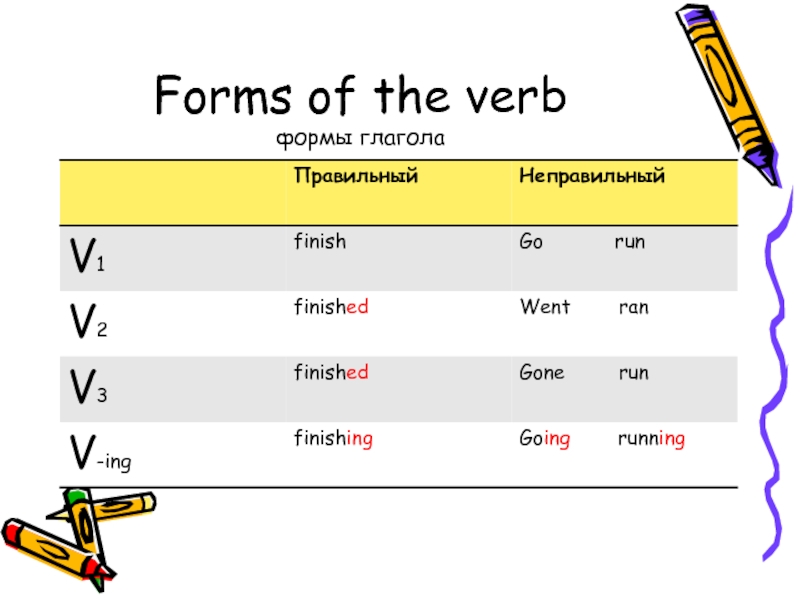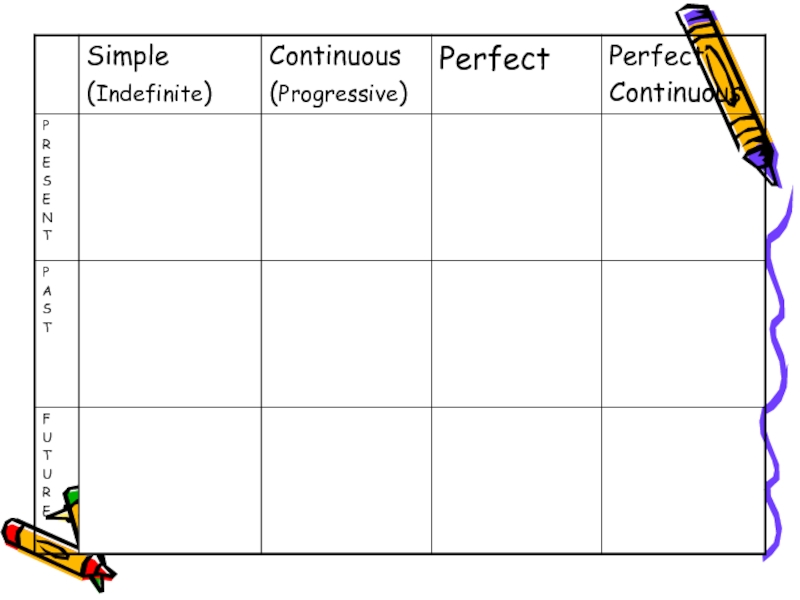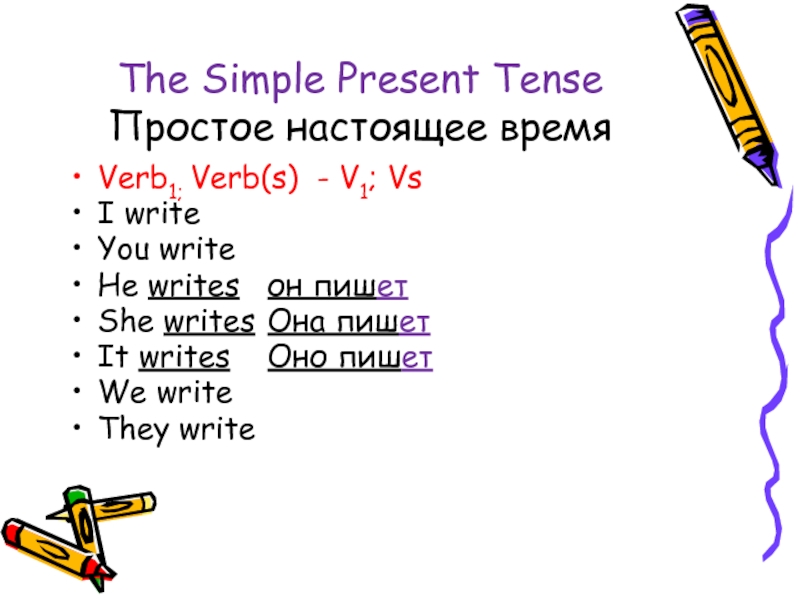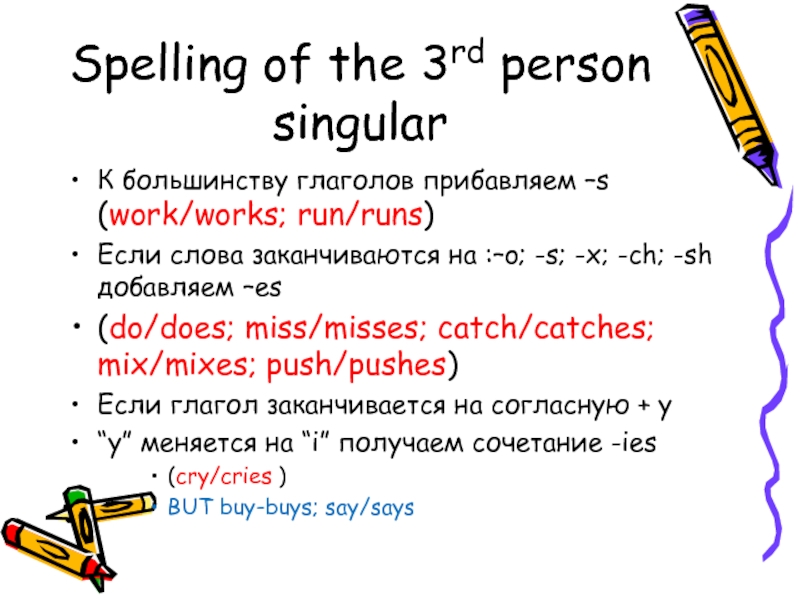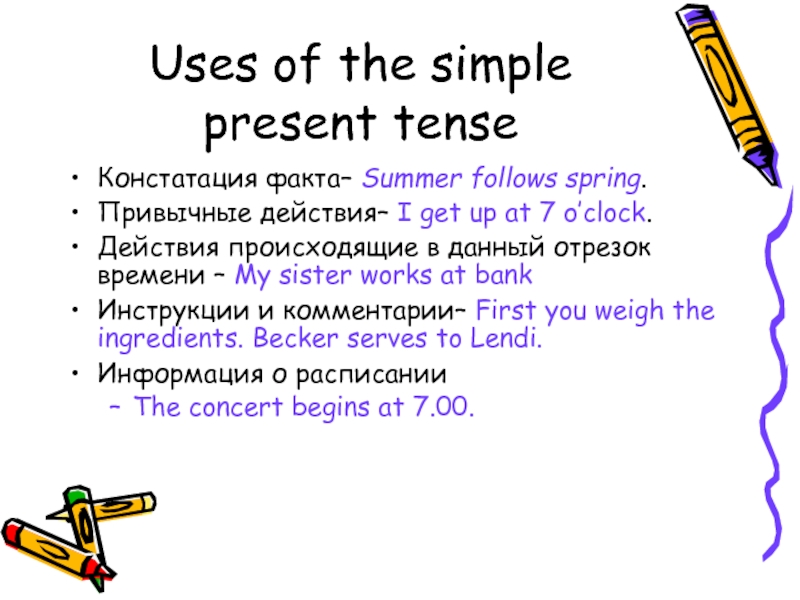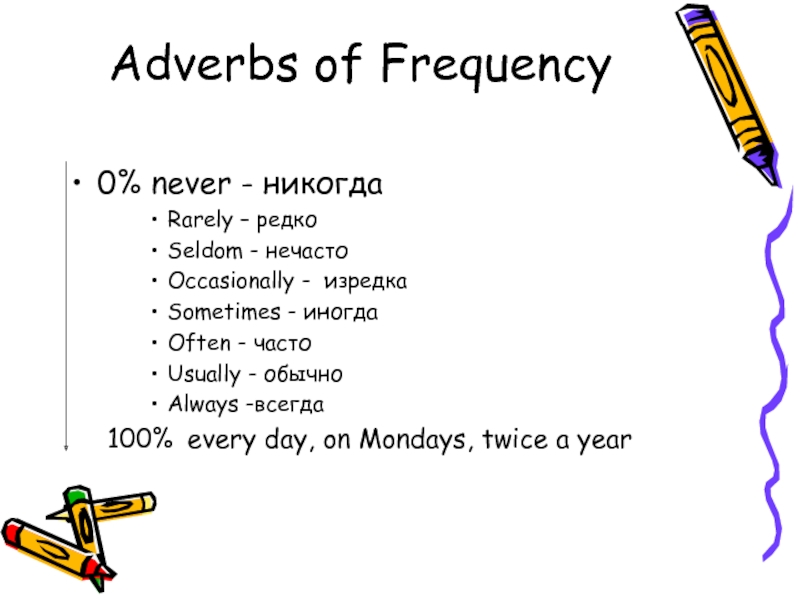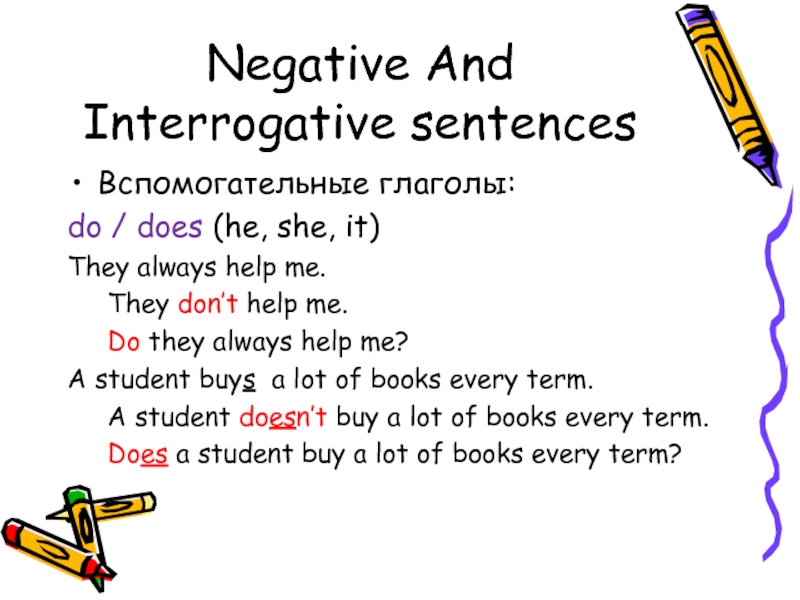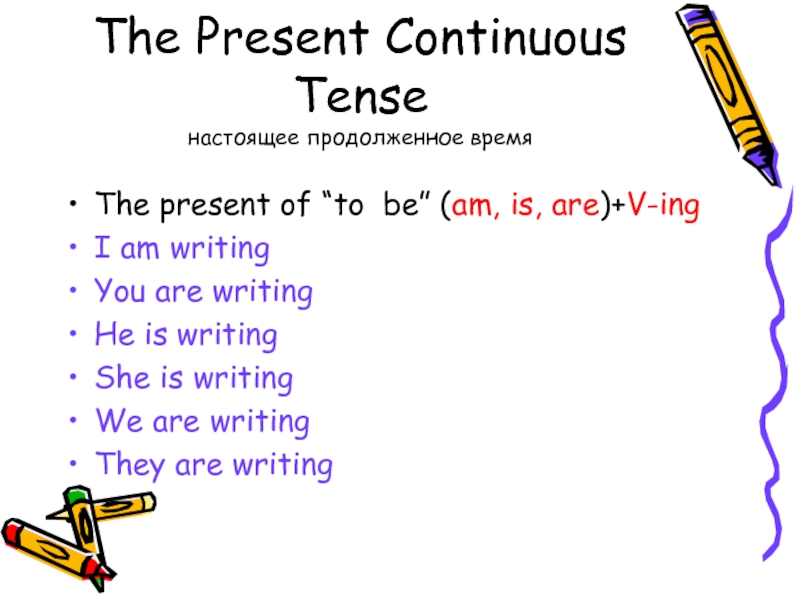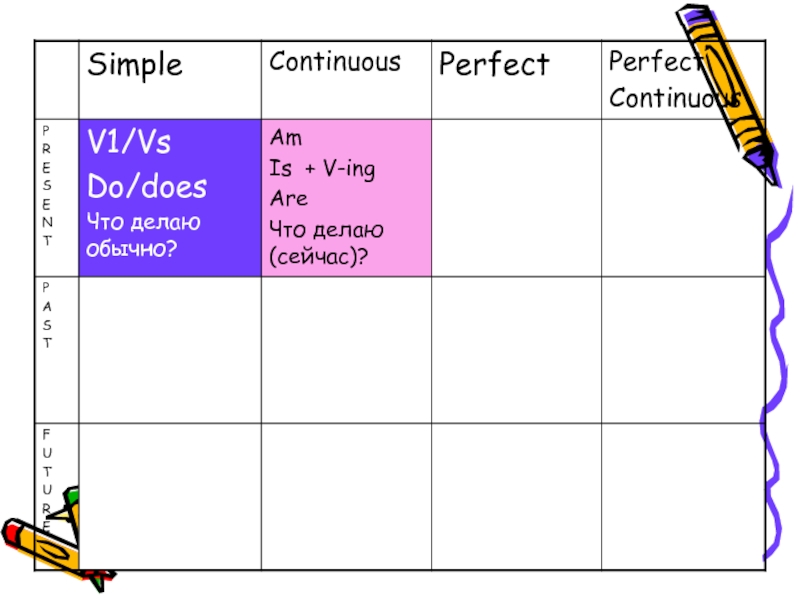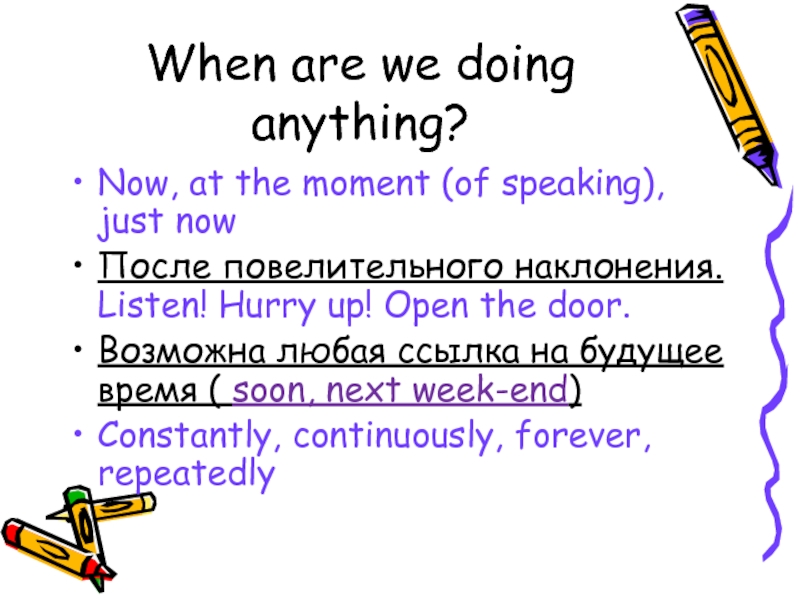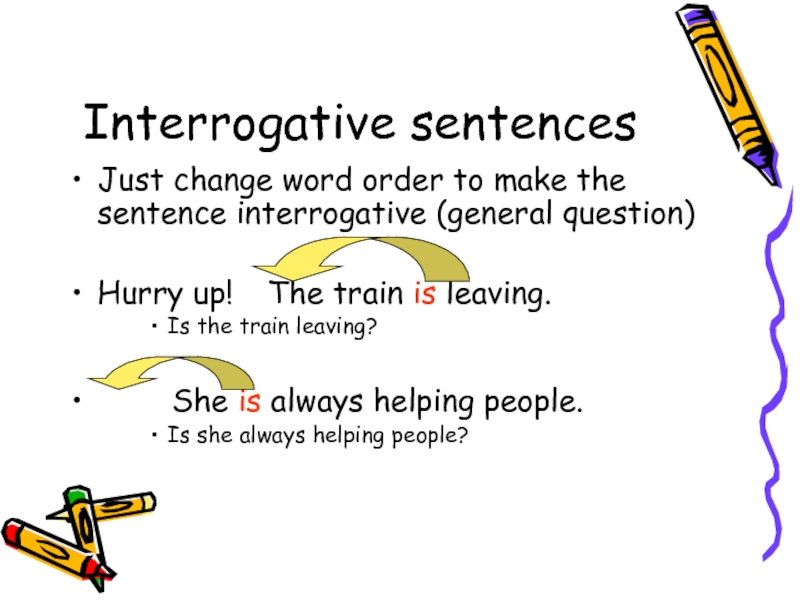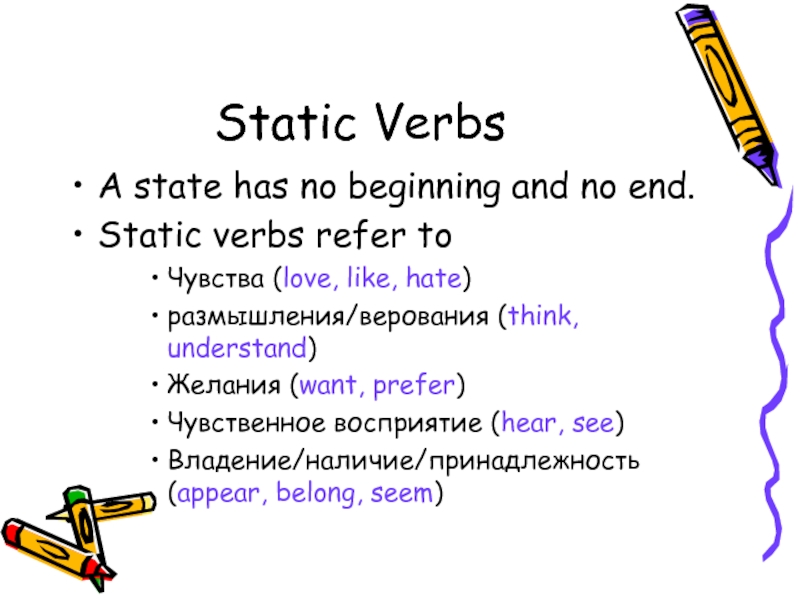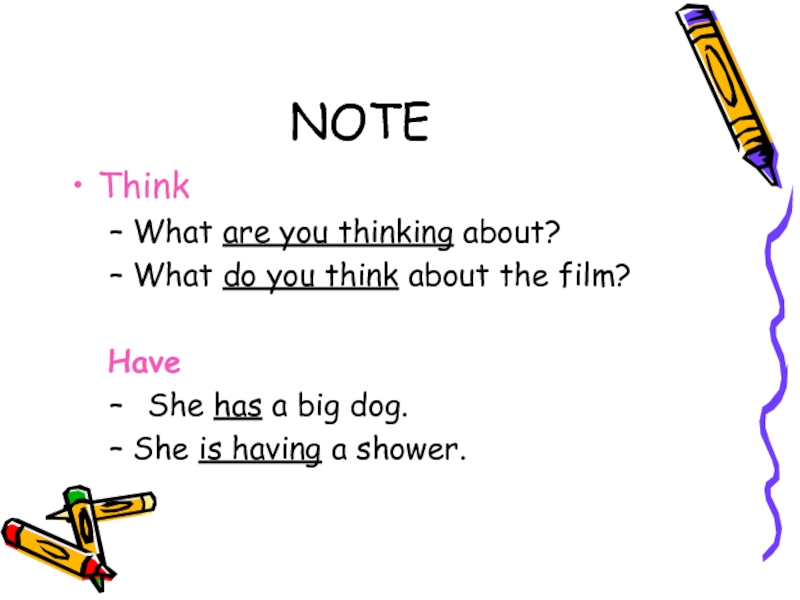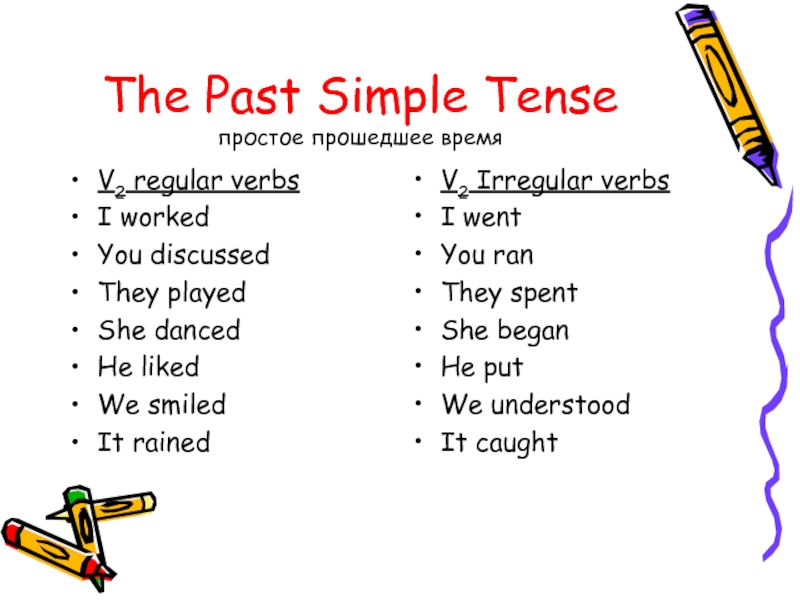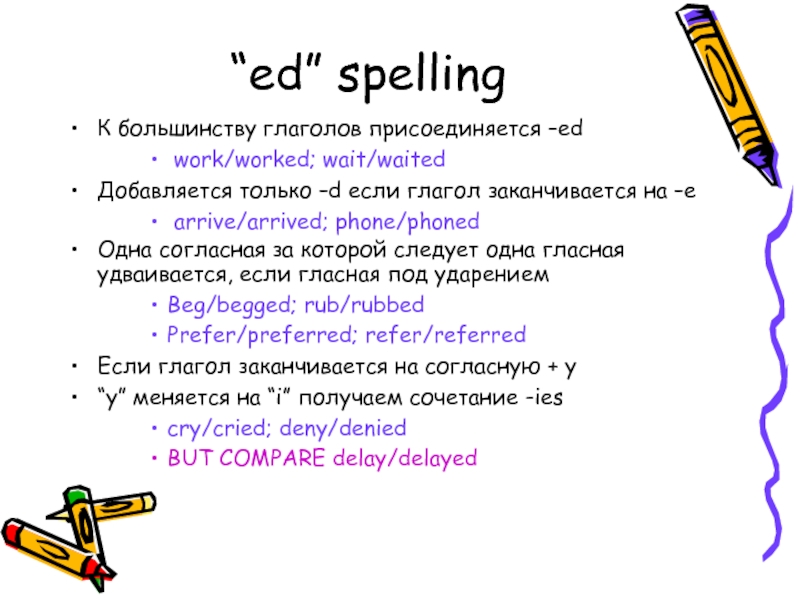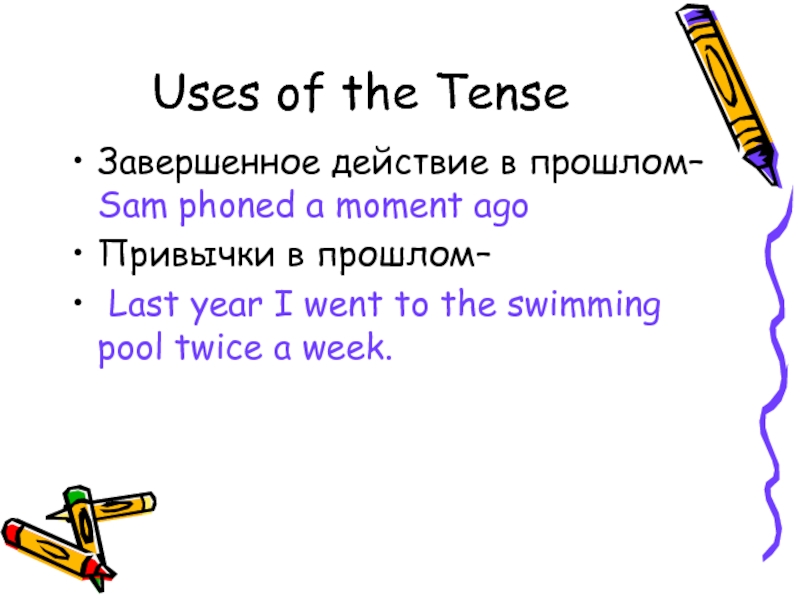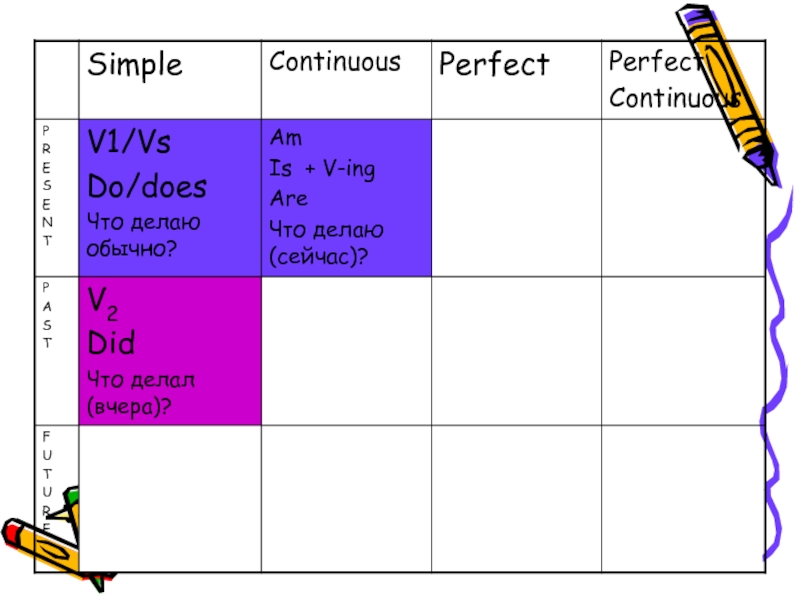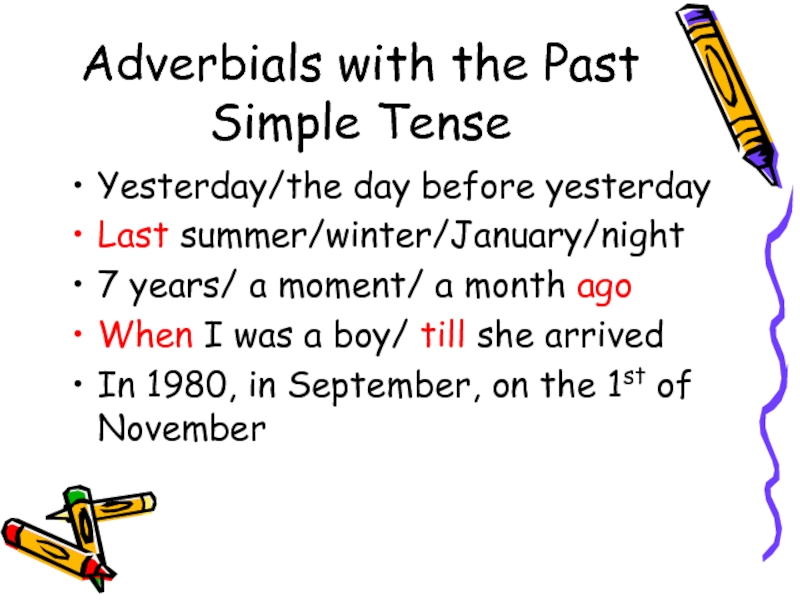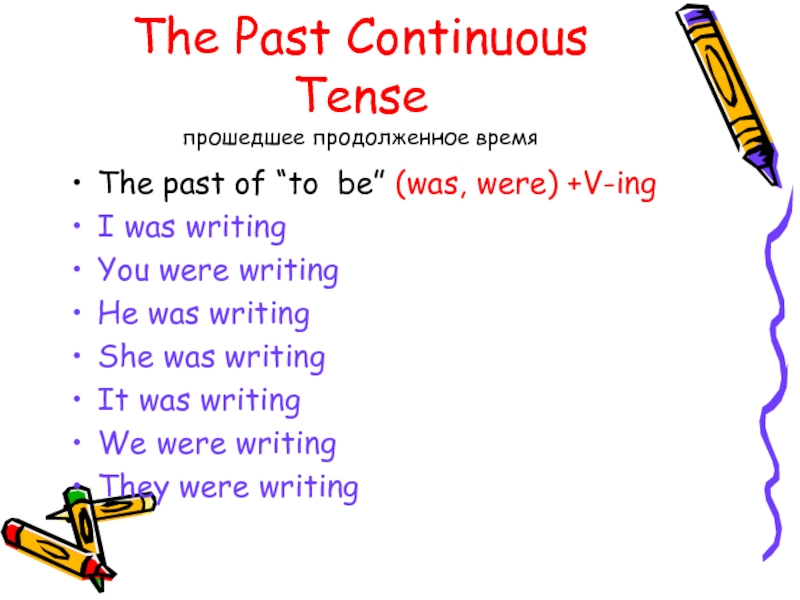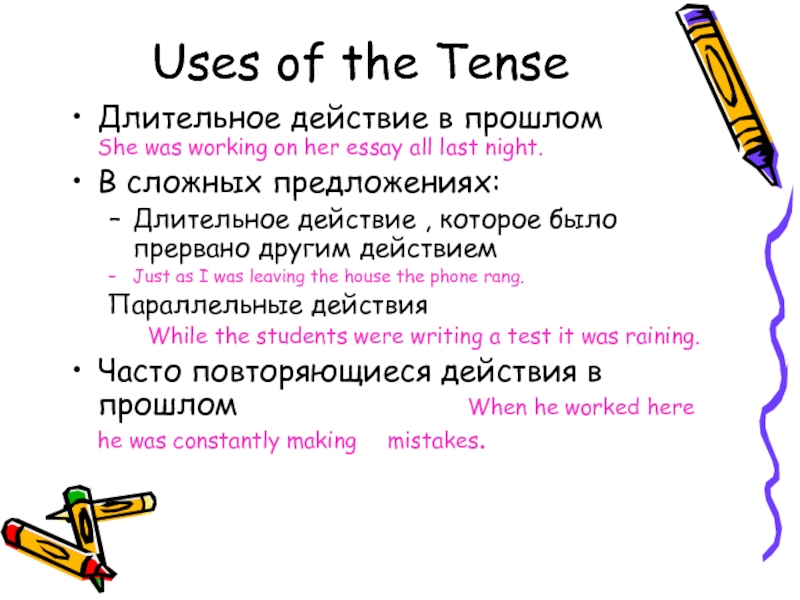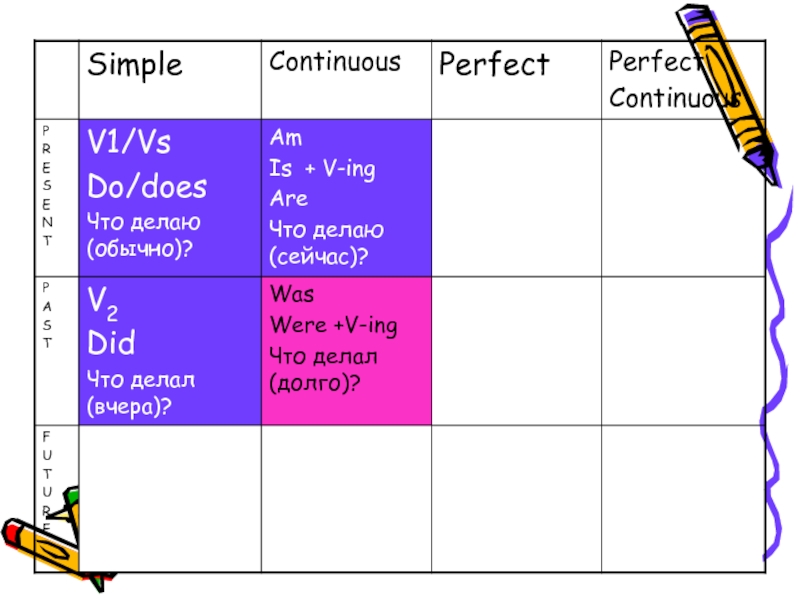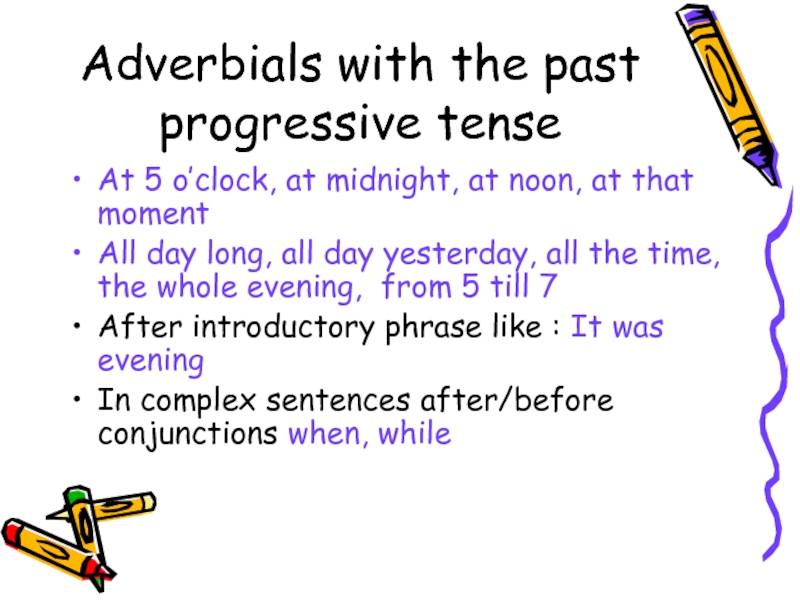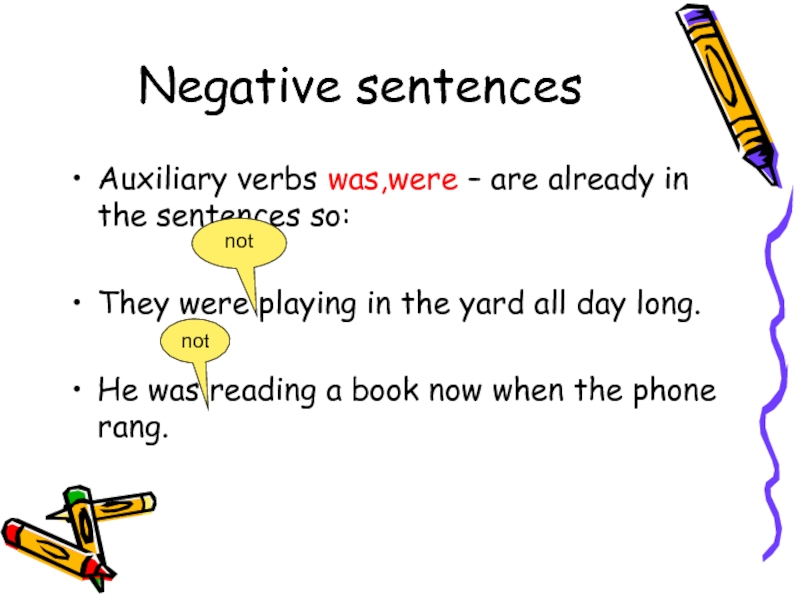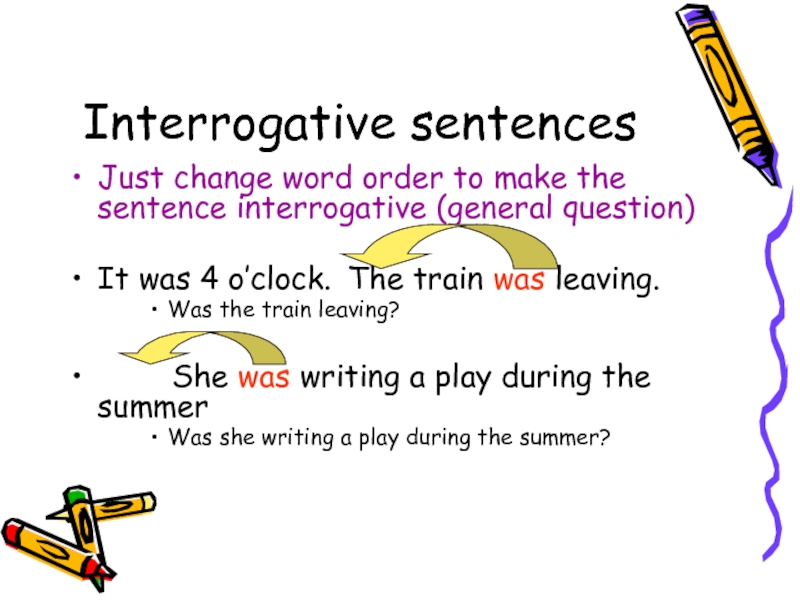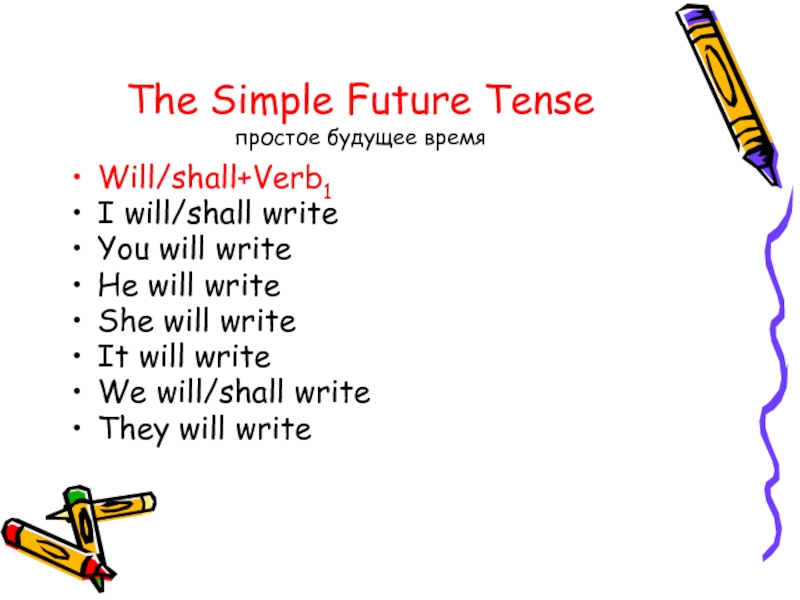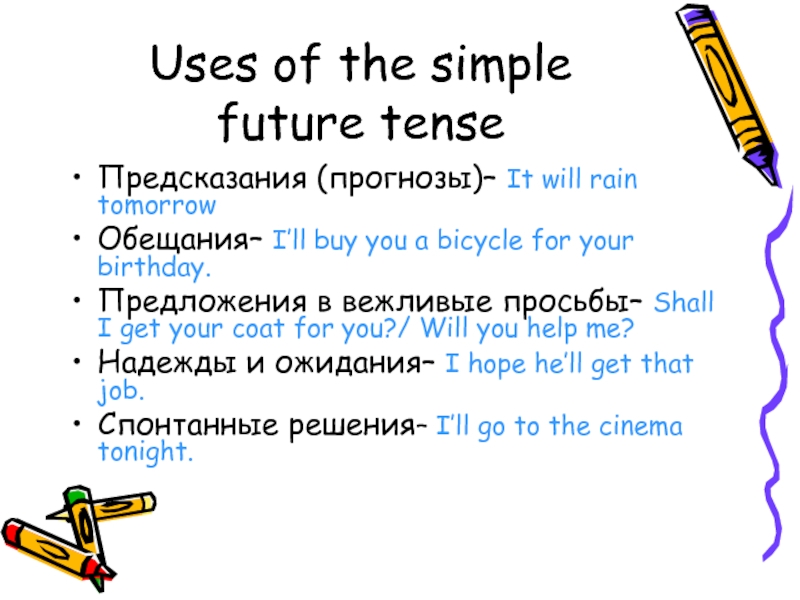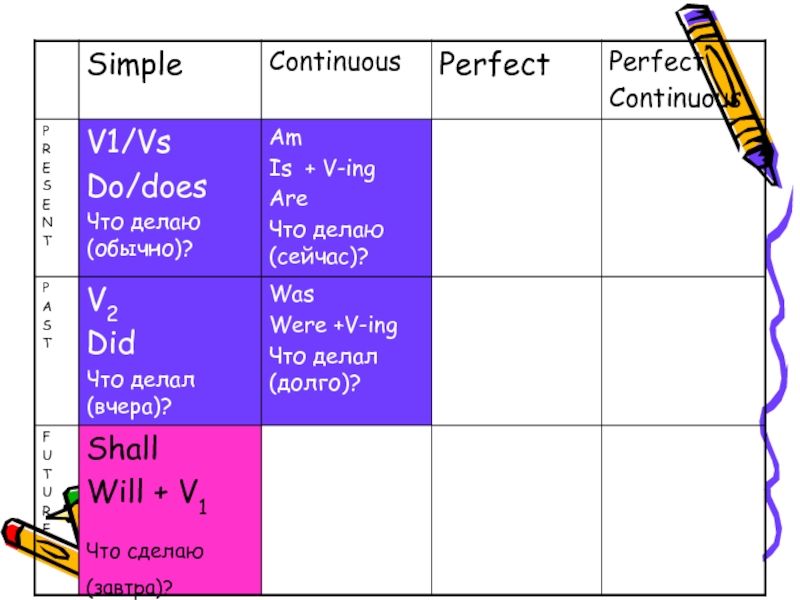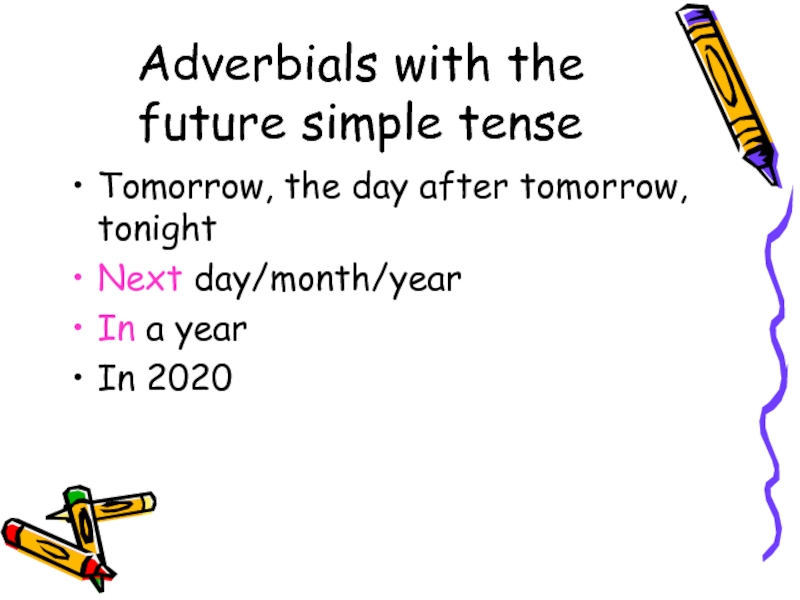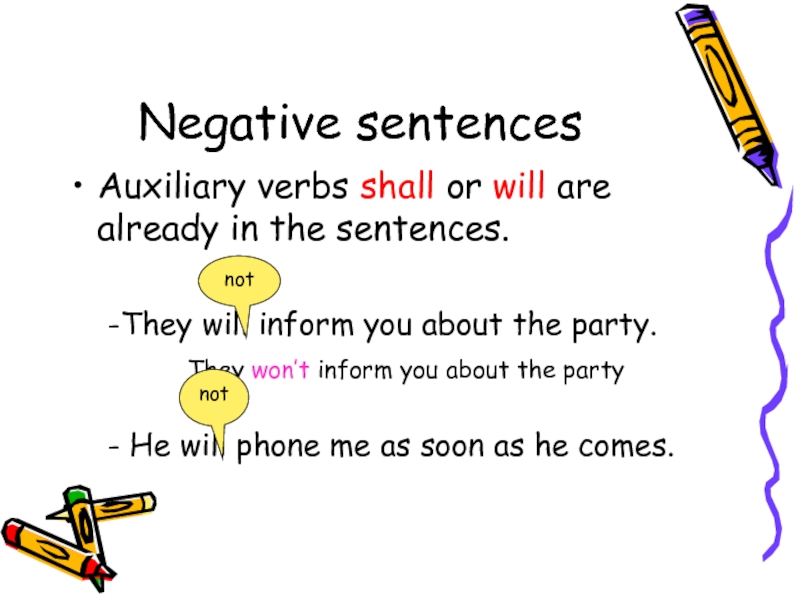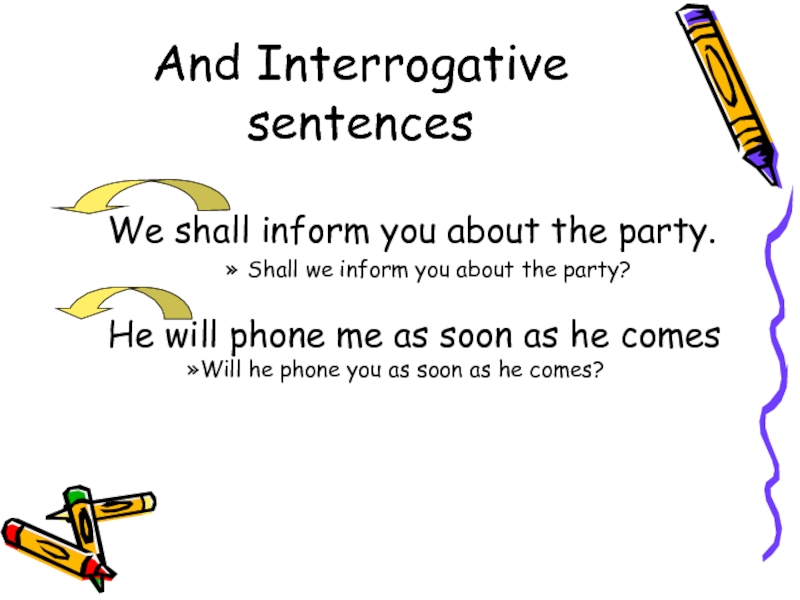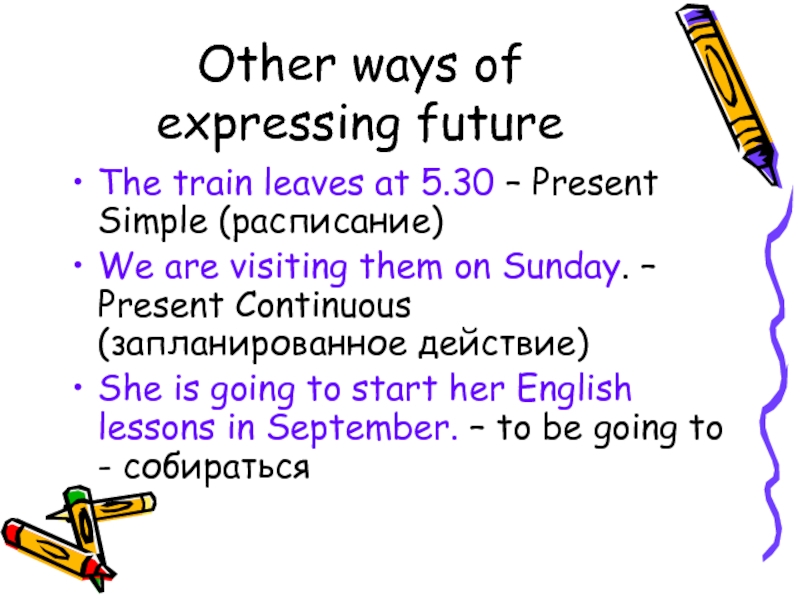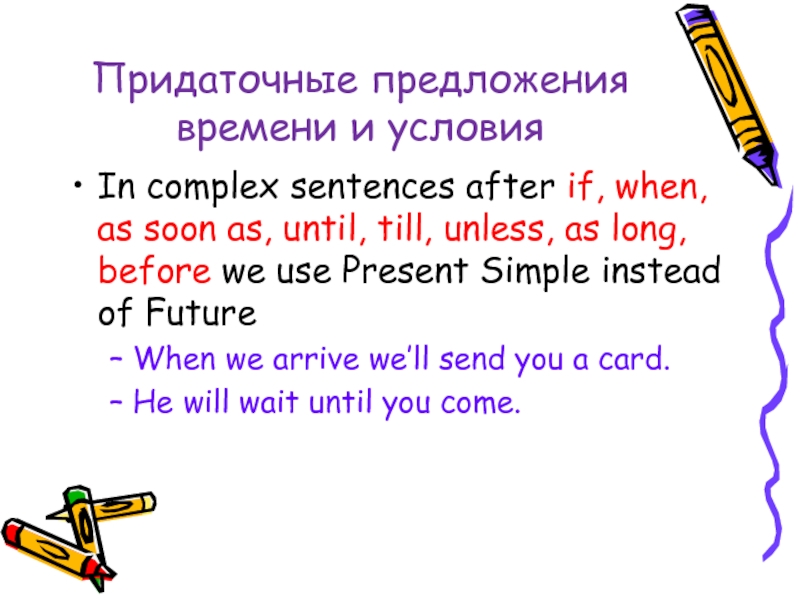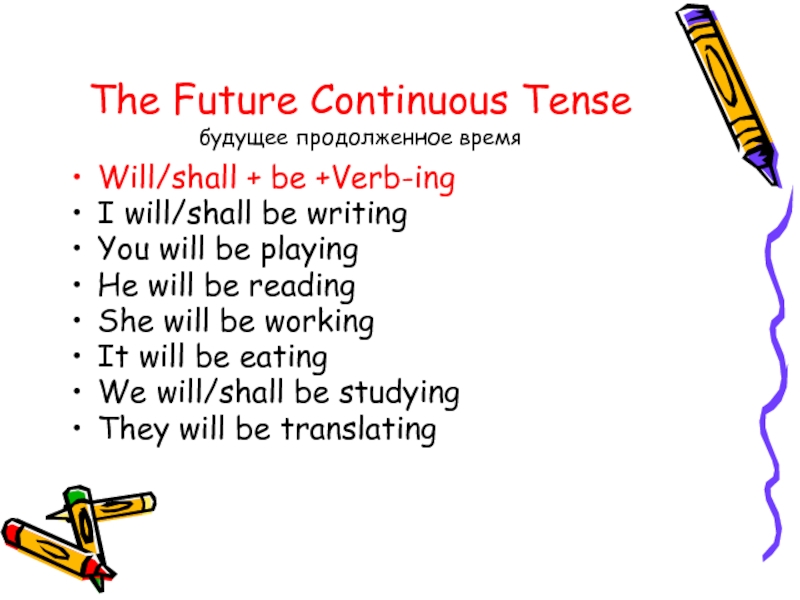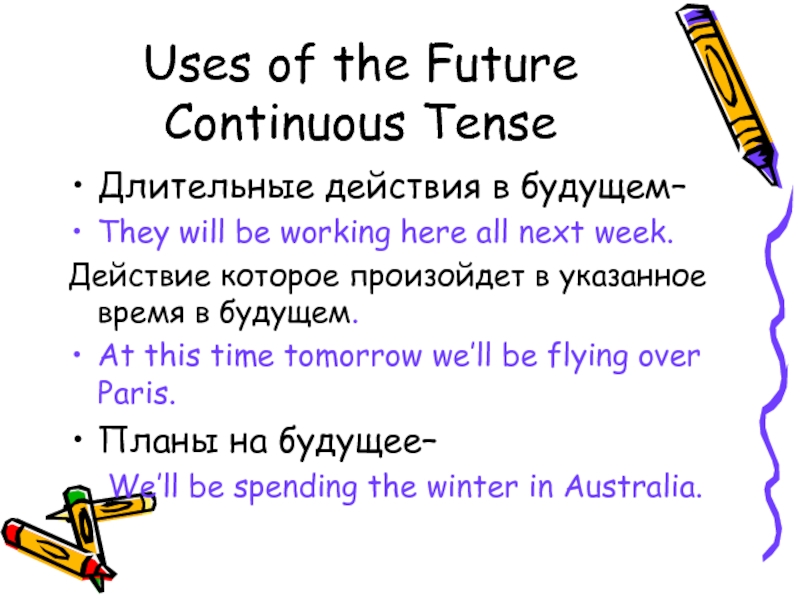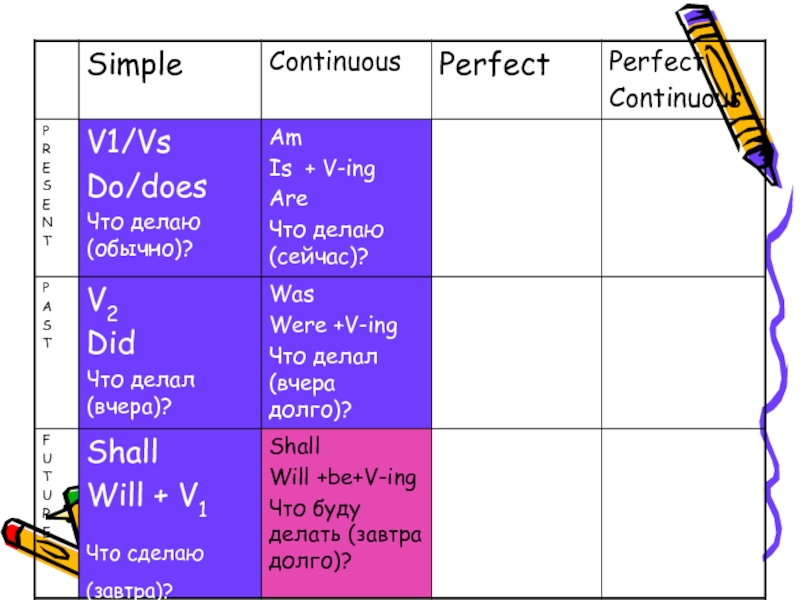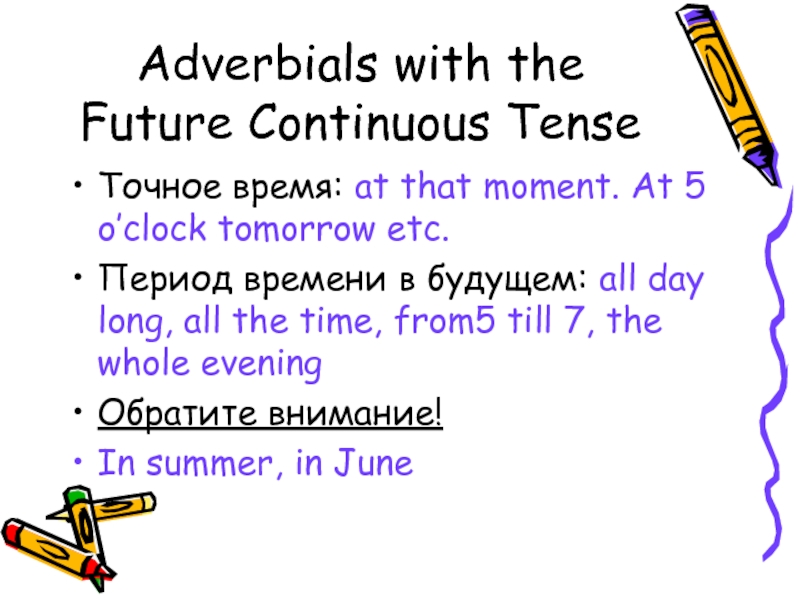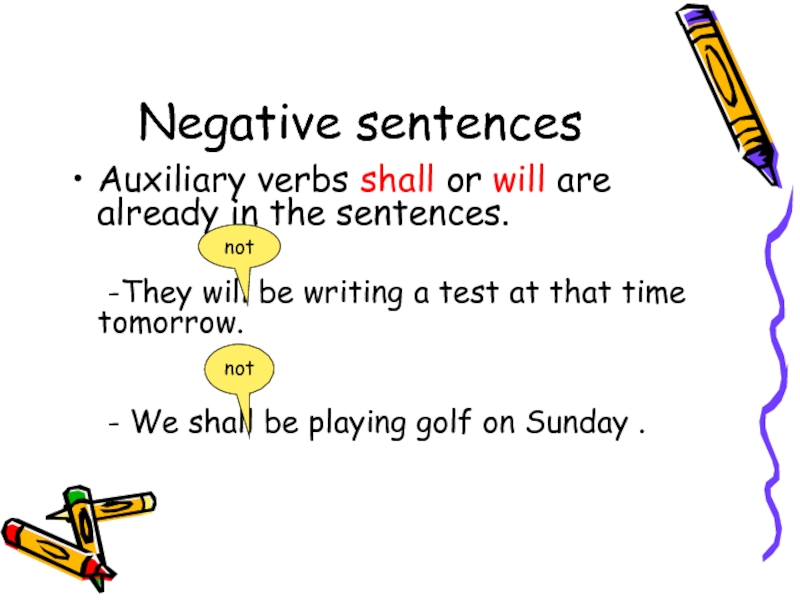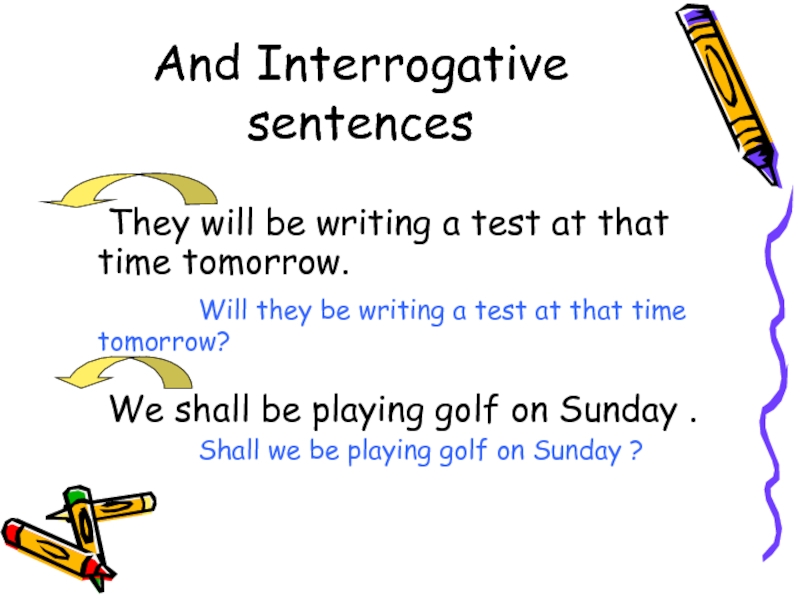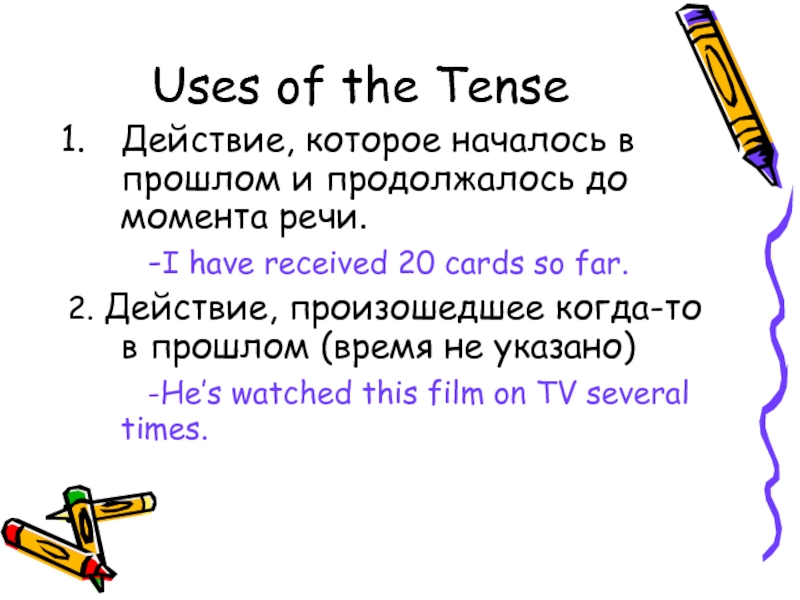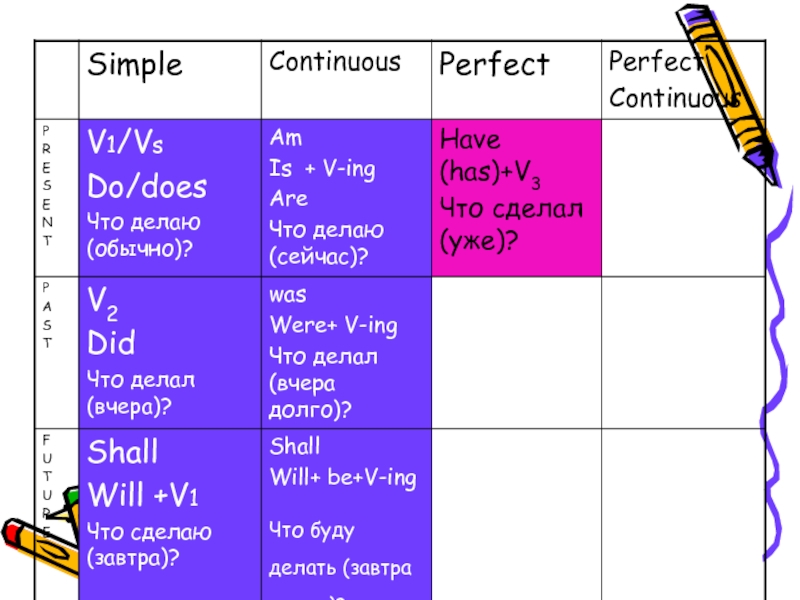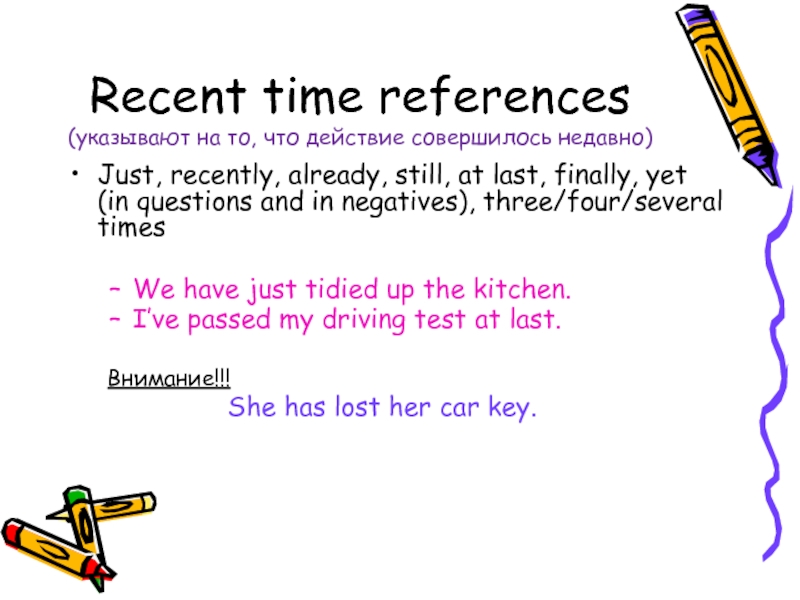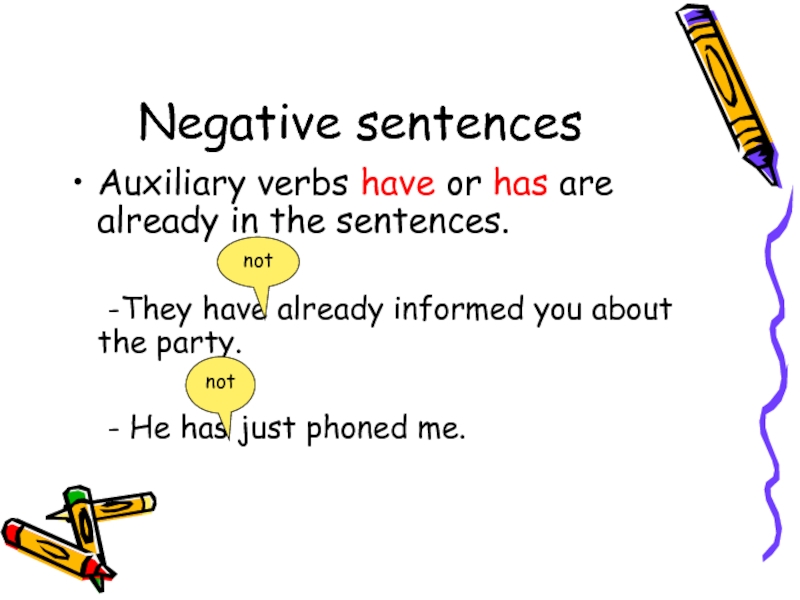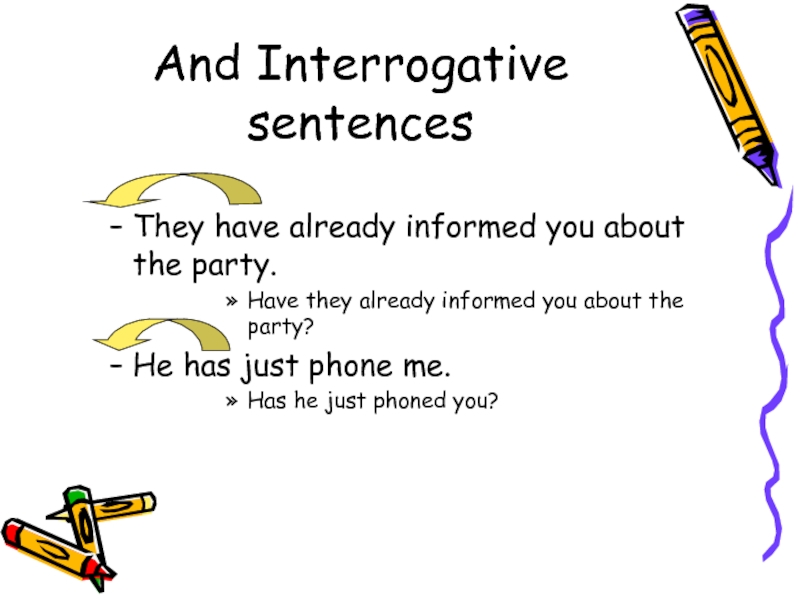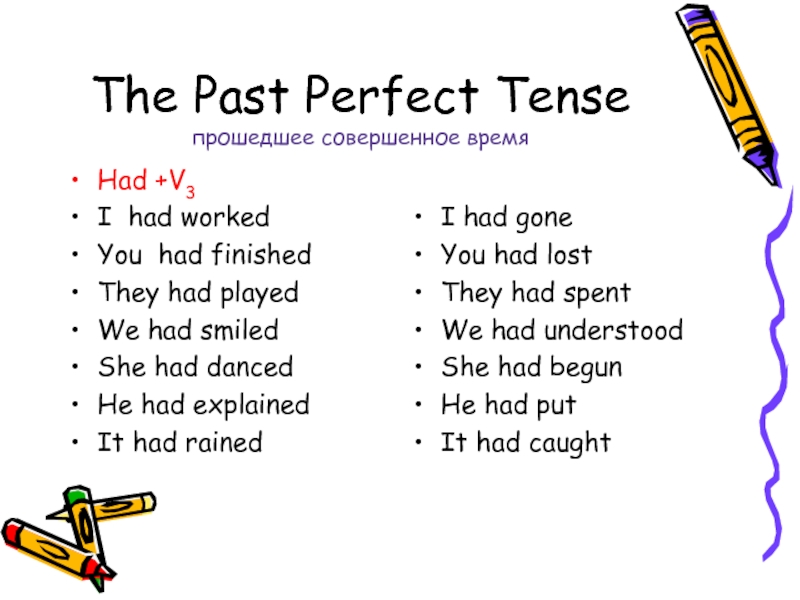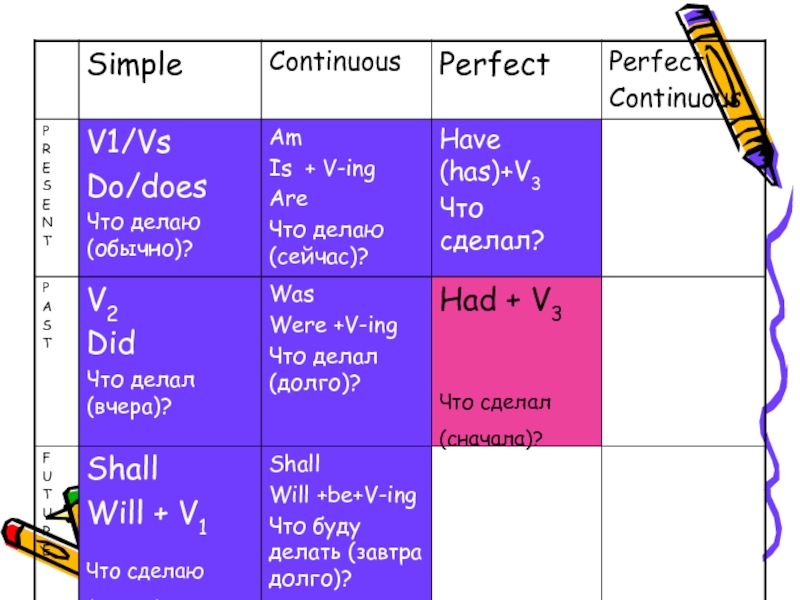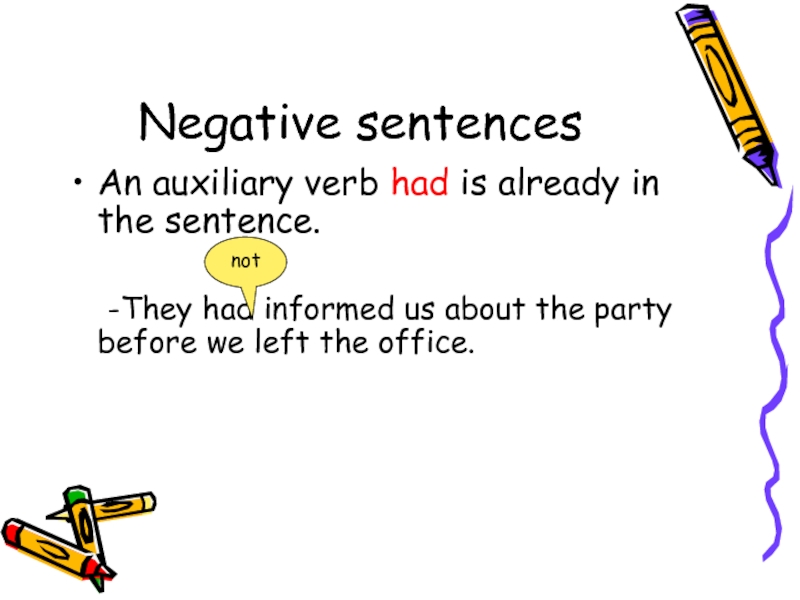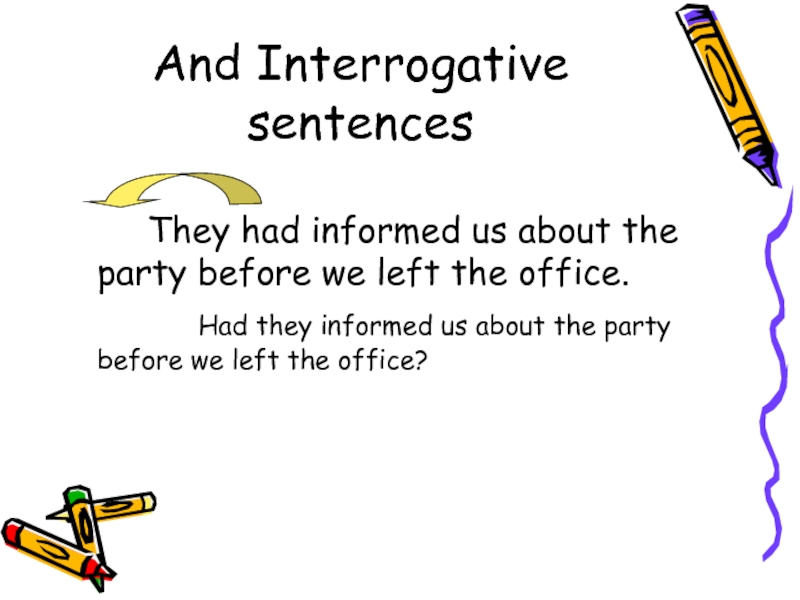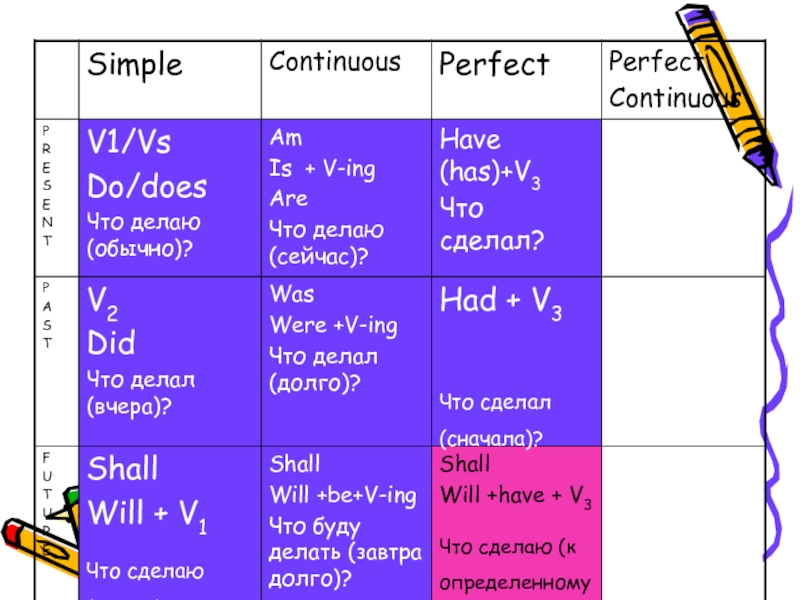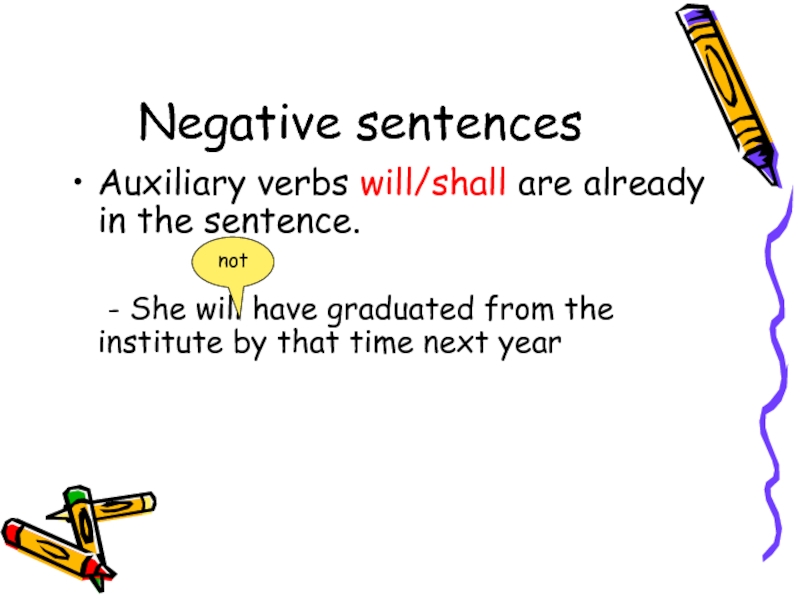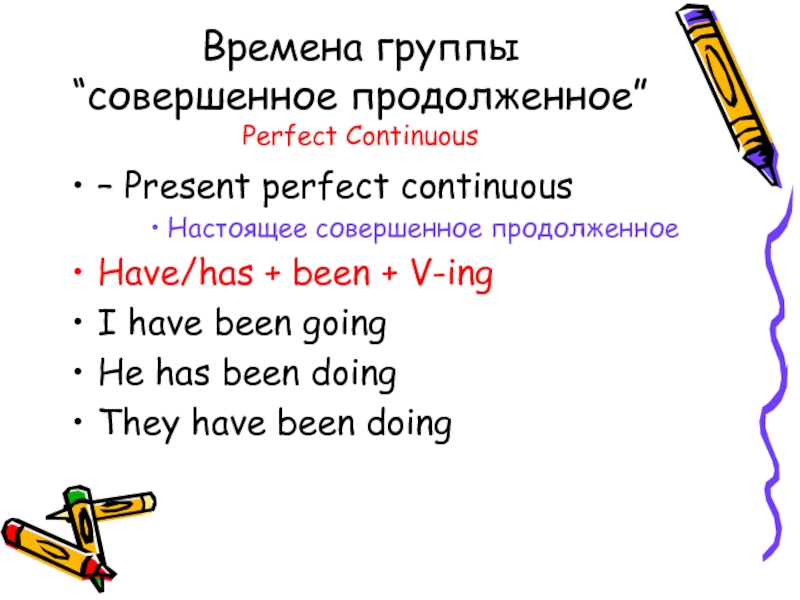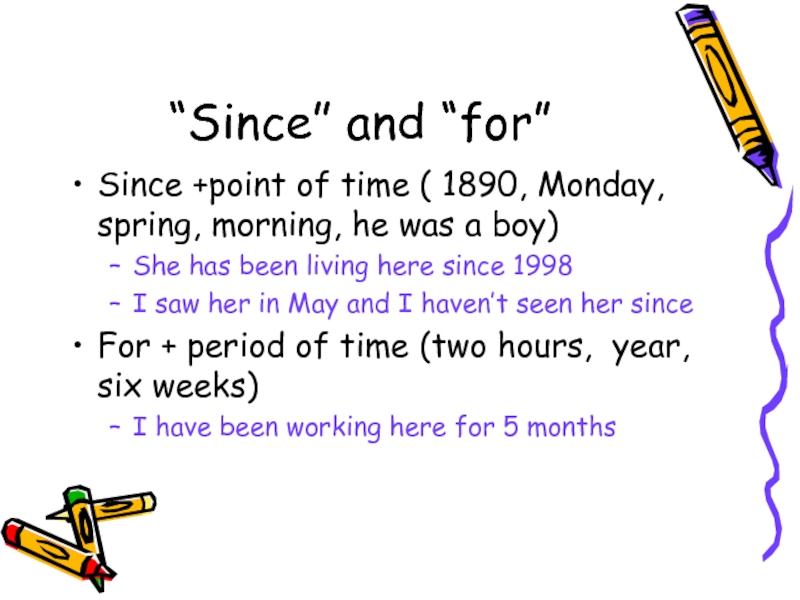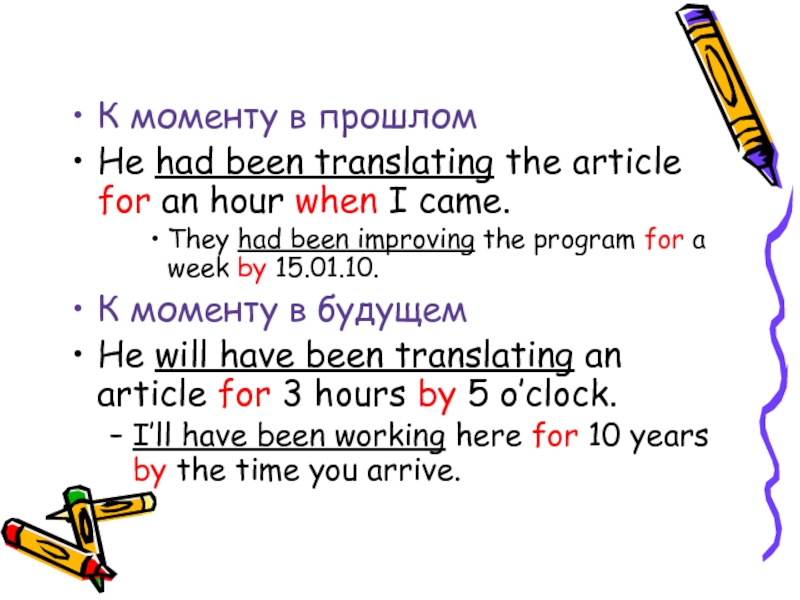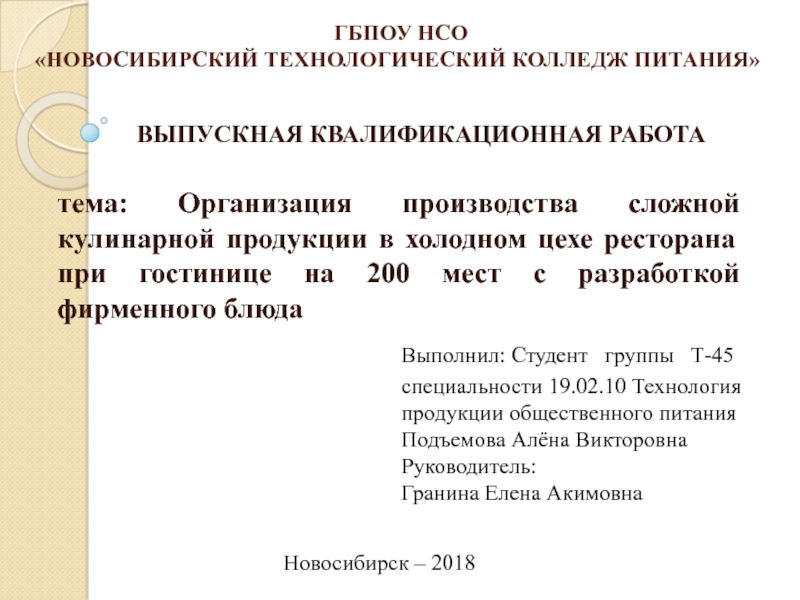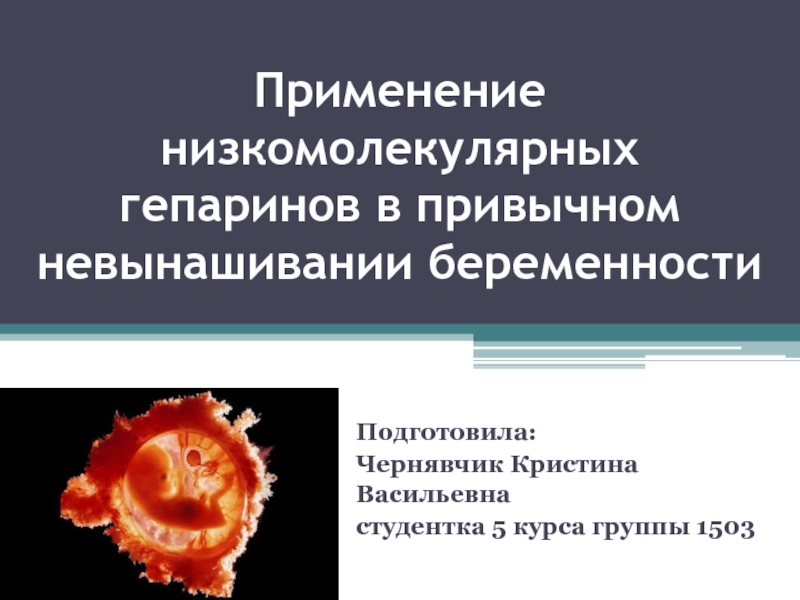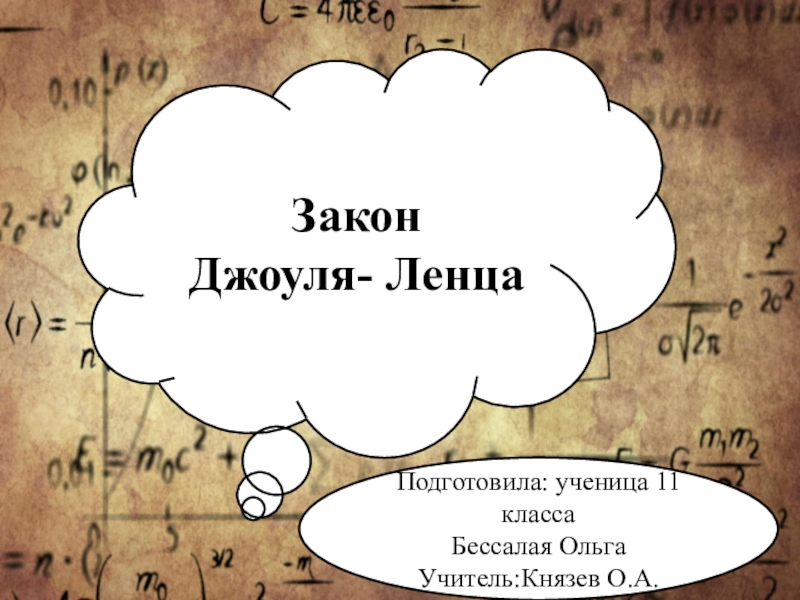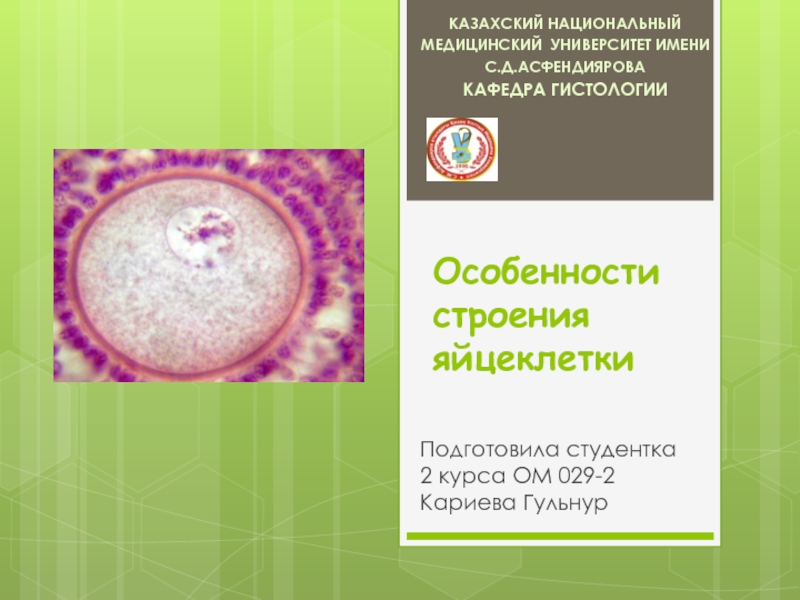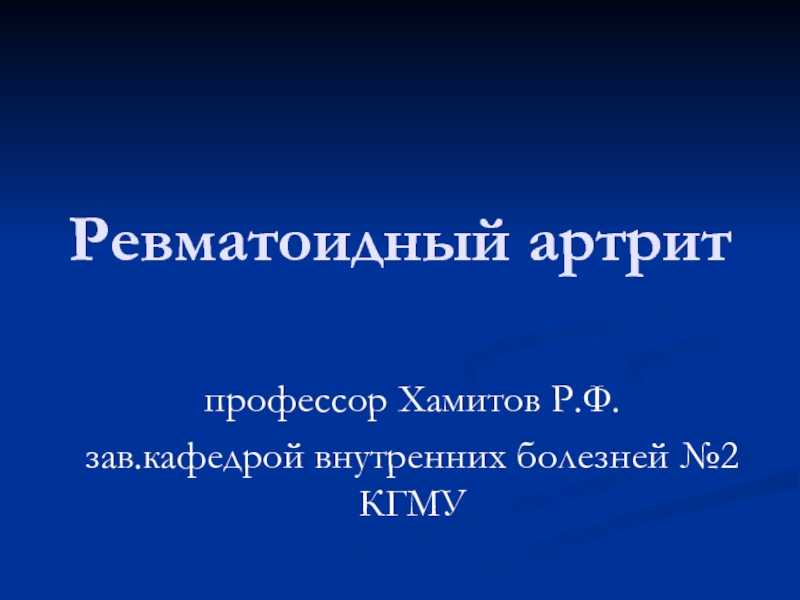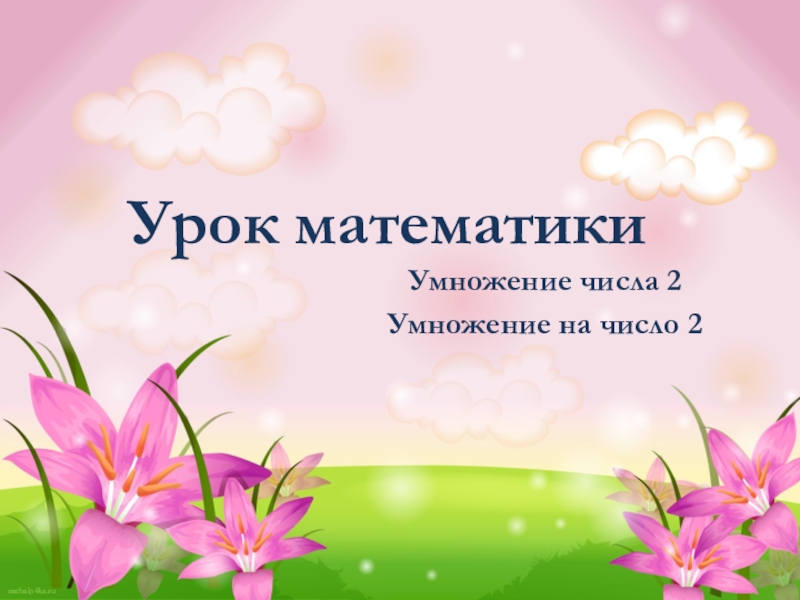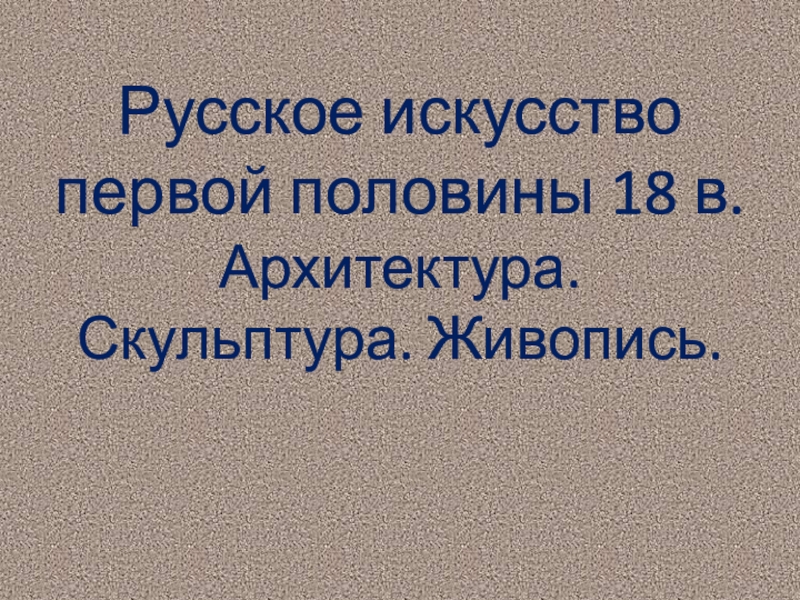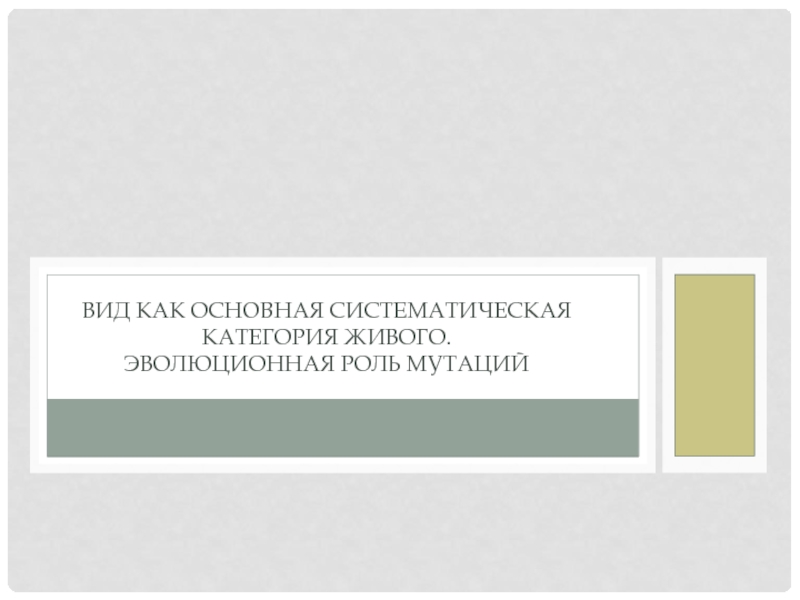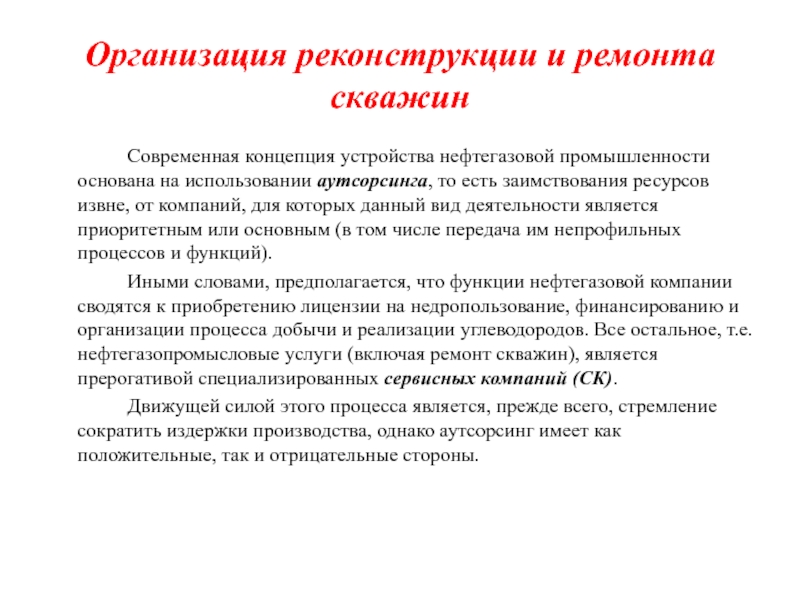Разделы презентаций
- Разное
- Английский язык
- Астрономия
- Алгебра
- Биология
- География
- Геометрия
- Детские презентации
- Информатика
- История
- Литература
- Математика
- Медицина
- Менеджмент
- Музыка
- МХК
- Немецкий язык
- ОБЖ
- Обществознание
- Окружающий мир
- Педагогика
- Русский язык
- Технология
- Физика
- Философия
- Химия
- Шаблоны, картинки для презентаций
- Экология
- Экономика
- Юриспруденция
Tenses Active Voice
Содержание
- 1. Tenses Active Voice
- 2. Forms of the verb формы глагола
- 3. Слайд 3
- 4. The Simple Present Tense Простое настоящее
- 5. Spelling of the 3rd person singularК большинству
- 6. Uses of the simple present tenseКонстатация факта–
- 7. Слайд 7
- 8. Adverbs of Frequency 0% never - никогдаRarely
- 9. Negative And Interrogative sentencesВспомогательные глаголы: do /
- 10. The Present Continuous Tense настоящее продолженное времяThe
- 11. Spelling: how to add ‘-ing’ to a
- 12. Uses of the TenseДействие происходит в момент
- 13. Слайд 13
- 14. When are we doing anything?Now, at the
- 15. Negative sentencesAuxiliary verbs am, is, are –
- 16. Interrogative sentencesJust change word order to make
- 17. Static VerbsA state has no beginning and
- 18. NOTEThinkWhat are you thinking about?What do you
- 19. The Past Simple Tense простое прошедшее времяV2
- 20. “ed” spellingК большинству глаголов присоединяется –ed
- 21. Uses of the TenseЗавершенное действие в прошлом–
- 22. Слайд 22
- 23. Adverbials with the Past Simple TenseYesterday/the day
- 24. Negative And Interrogative sentencesAuxiliary verb is always
- 25. The Past Continuous Tense прошедшее продолженное времяThe
- 26. Uses of the TenseДлительное действие в прошлом She
- 27. Слайд 27
- 28. Adverbials with the past progressive tenseAt 5
- 29. Negative sentencesAuxiliary verbs was,were – are already
- 30. Interrogative sentencesJust change word order to make
- 31. The Simple Future Tense простое будущее времяWill/shall+Verb1I
- 32. Uses of the simple future tenseПредсказания (прогнозы)–
- 33. Слайд 33
- 34. Adverbials with the future simple tenseTomorrow, the day after tomorrow, tonightNext day/month/yearIn a yearIn 2020
- 35. Negative sentencesAuxiliary verbs shall or will are
- 36. And Interrogative sentences We shall inform you about
- 37. Other ways of expressing futureThe train leaves
- 38. Придаточные предложения времени и условияIn complex sentences
- 39. The Future Continuous Tense будущее продолженное времяWill/shall
- 40. Uses of the Future Continuous TenseДлительные действия
- 41. Слайд 41
- 42. Adverbials with the Future Continuous TenseТочное время:
- 43. Complex sentences Before he leaves for London
- 44. Negative sentencesAuxiliary verbs shall or will are
- 45. And Interrogative sentences They will be writing a
- 46. The Present Perfect Tense настоящее совершенное времяHave
- 47. Uses of the TenseДействие, которое началось в
- 48. Слайд 48
- 49. Adverbials that suggest ”up to present” (к
- 50. Recent time references (указывают на то, что
- 51. Negative sentencesAuxiliary verbs have or has are
- 52. And Interrogative sentencesThey have already informed you
- 53. The Past Perfect Tense прошедшее совершенное времяHad
- 54. Uses of the TenseДействие , которое совершилось
- 55. Слайд 55
- 56. What helps us to use Past Perfect
- 57. Negative sentencesAn auxiliary verb had is already
- 58. And Interrogative sentences They had informed us about
- 59. The Future Perfect Tense будущее совершенное времяShall/will
- 60. Действие , которое завершиться к указанному моменту
- 61. a certain time may be expressed by:Adverbials
- 62. Слайд 62
- 63. Negative sentencesAuxiliary verbs will/shall are already in
- 64. And Interrogative sentences She will have graduated from
- 65. Времена группы “совершенное продолженное” Perfect
- 66. Действие, которое длилось какое-то время к моменту
- 67. “Since” and “for”Since +point of time (
- 68. Past perfect continuous прошедшее совершенное продолженноеHad +
- 69. The Future Perfect Continuous будущее совершенное
- 70. К моменту в прошломHe had been translating
- 71. Слайд 71
- 72. Скачать презентанцию
Слайды и текст этой презентации
Слайд 5Spelling of the 3rd person singular
К большинству глаголов прибавляем –s
(work/works; run/runs)
Если слова заканчиваются на :–o; -s; -x; -ch; -sh
добавляем –es(do/does; miss/misses; catch/catches; mix/mixes; push/pushes)
Если глагол заканчивается на согласную + y
“y” меняется на “i” получаем сочетание -ies
(cry/cries )
BUT buy-buys; say/says
Слайд 6Uses of the simple present tense
Констатация факта– Summer follows spring.
Привычные
действия– I get up at 7 o’clock.
Действия происходящие в данный
отрезок времени – My sister works at bankИнструкции и комментарии– First you weigh the ingredients. Becker serves to Lendi.
Информация о расписании
The concert begins at 7.00.
Слайд 8Adverbs of Frequency
0% never - никогда
Rarely – редко
Seldom -
нечасто
Occasionally - изредка
Sometimes - иногда
Often - часто
Usually - обычно
Always -всегда
100% every
day, on Mondays, twice a yearСлайд 9Negative And Interrogative sentences
Вспомогательные глаголы:
do / does (he, she,
it)
They always help me.
They don’t help me.
Do they always help
me?A student buys a lot of books every term.
A student doesn’t buy a lot of books every term.
Does a student buy a lot of books every term?
Слайд 10The Present Continuous Tense
настоящее продолженное время
The present of “to be”
(am, is, are)+V-ing
I am writing
You are writing
He is writing
She is
writingWe are writing
They are writing
Слайд 11Spelling: how to add ‘-ing’ to a verb
К большинству глаголов
прибавляем –ing
– beat/beating, carry/carrying
Если глагол заканчивается на –e, его опускаем
come/coming,
use/using. Но в сочетаниях –ee or –ge буква сохраняется
see/seeing, age/ageing
Одна согласная за которой следует одна гласная удваивается, если гласная под ударением
Sit/sitting, run/running
- begin/beginning
but: profit/profiting
сочетание -ic меняется на -ick – picnic/picnicking
сочетание -ie меняется на –y lie/lying
Слайд 12Uses of the Tense
Действие происходит в момент речи
– He’s working
at the moment
При описании длительных действий/ситуаций – We are studying
at MESI.Запланированное действие в будущем
– We‘re spending next summer in Australia.
Часто повторяющиеся действия (constantly, forever, repeatedly) – They are always talking at my lessons.
Слайд 14When are we doing anything?
Now, at the moment (of speaking),
just now
После повелительного наклонения. Listen! Hurry up! Open the door.
Возможна
любая ссылка на будущее время ( soon, next week-end)Constantly, continuously, forever, repeatedly
Слайд 15Negative sentences
Auxiliary verbs am, is, are – are already in
the sentences so:
Look! They are playing in the yard.
He
is reading a book now.not
not
Слайд 16Interrogative sentences
Just change word order to make the sentence interrogative
(general question)
Hurry up! The train is leaving.
Is the train leaving?
She is always helping people.Is she always helping people?
Слайд 17Static Verbs
A state has no beginning and no end.
Static verbs
refer to
Чувства (love, like, hate)
размышления/верования (think, understand)
Желания (want, prefer)
Чувственное
восприятие (hear, see)Владение/наличие/принадлежность (appear, belong, seem)
Слайд 18NOTE
Think
What are you thinking about?
What do you think about the
film?
Have
She has a big dog.
She is having a shower.
Слайд 19The Past Simple Tense
простое прошедшее время
V2 regular verbs
I worked
You discussed
They
played
She danced
He liked
We smiled
It rained
V2 Irregular verbs
I went
You ran
They spent
She
beganHe put
We understood
It caught
Слайд 20 “ed” spelling
К большинству глаголов присоединяется –ed
work/worked; wait/waited
Добавляется только
–d если глагол заканчивается на –e
arrive/arrived; phone/phoned
Одна согласная за
которой следует одна гласная удваивается, если гласная под ударениемBeg/begged; rub/rubbed
Prefer/preferred; refer/referred
Если глагол заканчивается на согласную + y
“y” меняется на “i” получаем сочетание -ies
cry/cried; deny/denied
BUT COMPARE delay/delayed
Слайд 21Uses of the Tense
Завершенное действие в прошлом– Sam phoned a
moment ago
Привычки в прошлом–
Last year I went to the
swimming pool twice a week.Слайд 23Adverbials with the Past Simple Tense
Yesterday/the day before yesterday
Last summer/winter/January/night
7
years/ a moment/ a month ago
When I was a boy/
till she arrivedIn 1980, in September, on the 1st of November
Слайд 24Negative And Interrogative sentences
Auxiliary verb is always did
They met at
the station yesterday
They didn’t met at the station yesterday.
Did they
met at the station yesterday?meet
meet
Слайд 25The Past Continuous Tense
прошедшее продолженное время
The past of “to be”
(was, were) +V-ing
I was writing
You were writing
He was writing
She was
writingIt was writing
We were writing
They were writing
Слайд 26Uses of the Tense
Длительное действие в прошлом She was working on
her essay all last night.
В сложных предложениях:
Длительное действие , которое
было прервано другим действием Just as I was leaving the house the phone rang.
Параллельные действия
While the students were writing a test it was raining.
Часто повторяющиеся действия в прошлом When he worked here he was constantly making mistakes.
Слайд 28Adverbials with the past progressive tense
At 5 o’clock, at midnight,
at noon, at that moment
All day long, all day yesterday,
all the time, the whole evening, from 5 till 7After introductory phrase like : It was evening
In complex sentences after/before conjunctions when, while
Слайд 29Negative sentences
Auxiliary verbs was,were – are already in the sentences
so:
They were playing in the yard all day long.
He was
reading a book now when the phone rang.not
not
Слайд 30Interrogative sentences
Just change word order to make the sentence interrogative
(general question)
It was 4 o’clock. The train was leaving.
Was the
train leaving?She was writing a play during the summer
Was she writing a play during the summer?
Слайд 31The Simple Future Tense
простое будущее время
Will/shall+Verb1
I will/shall write
You will write
He
will write
She will write
It will write
We will/shall write
They will write
Слайд 32Uses of the simple future tense
Предсказания (прогнозы)– It will rain
tomorrow
Обещания– I’ll buy you a bicycle for your birthday.
Предложения в
вежливые просьбы– Shall I get your coat for you?/ Will you help me?Надежды и ожидания– I hope he’ll get that job.
Спонтанные решения– I’ll go to the cinema tonight.
Слайд 34Adverbials with the future simple tense
Tomorrow, the day after tomorrow,
tonight
Next day/month/year
In a year
In 2020
Слайд 35Negative sentences
Auxiliary verbs shall or will are already in the
sentences.
-They will inform you about the party.
They won’t inform
you about the party- He will phone me as soon as he comes.
not
not
Слайд 36And Interrogative sentences
We shall inform you about the party.
Shall we
inform you about the party?
He will phone me as soon
as he comes»Will he phone you as soon as he comes?
Слайд 37Other ways of expressing future
The train leaves at 5.30 –
Present Simple (расписание)
We are visiting them on Sunday. – Present
Continuous (запланированное действие)She is going to start her English lessons in September. – to be going to - собираться
Слайд 38Придаточные предложения времени и условия
In complex sentences after if, when,
as soon as, until, till, unless, as long, before we
use Present Simple instead of FutureWhen we arrive we’ll send you a card.
He will wait until you come.
Слайд 39The Future Continuous Tense
будущее продолженное время
Will/shall + be +Verb-ing
I will/shall
be writing
You will be playing
He will be reading
She will be
workingIt will be eating
We will/shall be studying
They will be translating
Слайд 40Uses of the Future Continuous Tense
Длительные действия в будущем–
They
will be working here all next week.
Действие которое произойдет в
указанное время в будущем.At this time tomorrow we’ll be flying over Paris.
Планы на будущее–
We’ll be spending the winter in Australia.
Слайд 42Adverbials with the Future Continuous Tense
Точное время: at that moment.
At 5 o’clock tomorrow etc.
Период времени в будущем: all day
long, all the time, from5 till 7, the whole eveningОбратите внимание!
In summer, in June
Слайд 43Complex sentences
Before he leaves for London he will be
discussing all terms of contract.
I shall be working when he
returns.While she’ll be cooking supper her husband will be doing the flat.
Слайд 44Negative sentences
Auxiliary verbs shall or will are already in the
sentences.
-They will be writing a test at that time
tomorrow.- We shall be playing golf on Sunday .
not
not
Слайд 45And Interrogative sentences
They will be writing a test at that
time tomorrow.
Will they be writing a test at that
time tomorrow?We shall be playing golf on Sunday . Shall we be playing golf on Sunday ?
Слайд 46The Present Perfect Tense
настоящее совершенное время
Have (has)+V3
I have worked
You have
finished
They have played
We have smiled
She has danced
He has explained
It has
rained
I have gone
You have lost
They have spent
We have understood
She has begun
He has put
It has caught
Слайд 47Uses of the Tense
Действие, которое началось в прошлом и продолжалось
до момента речи.
-I have received 20 cards so far.
2. Действие,
произошедшее когда-то в прошлом (время не указано)-He’s watched this film on TV several times.
Слайд 49Adverbials that suggest ”up to present”
(к настоящему моменту)
Before (now); It’s
the first time…; so far; up till now; up to
the present; not … ever, never, ever (in questions)They’ve planted 14 rose-bushes so far this morning
Have you ever eaten a mango?
Слайд 50Recent time references
(указывают на то, что действие совершилось недавно)
Just, recently,
already, still, at last, finally, yet (in questions and in
negatives), three/four/several timesWe have just tidied up the kitchen.
I’ve passed my driving test at last.
Внимание!!!
She has lost her car key.
Слайд 51Negative sentences
Auxiliary verbs have or has are already in the
sentences.
-They have already informed you about the party.
- He
has just phoned me.not
not
Слайд 52And Interrogative sentences
They have already informed you about the party.
Have
they already informed you about the party?
He has just phone
me.Has he just phoned you?
Слайд 53The Past Perfect Tense
прошедшее совершенное время
Had +V3
I had worked
You had
finished
They had played
We had smiled
She had danced
He had explained
It had
rained
I had gone
You had lost
They had spent
We had understood
She had begun
He had put
It had caught
Слайд 54Uses of the Tense
Действие , которое совершилось до другого действия
в прошлом
- When I rang Jim had already left.
- He
hadn’t finished it by yesterday evening.Не исполненные надежды и пожелания– He had hoped to send me a card but he didn’t manage.
Слайд 56What helps us to use Past Perfect Tense
By that time,
by 3 o’clock, by Monday
When, after, as soon as, before,
by the time thatAlready, ever, just, never, never…before
to emphasize the sequence of tenses
Слайд 57Negative sentences
An auxiliary verb had is already in the sentence.
-They had informed us about the party before we left
the office.not
Слайд 58And Interrogative sentences
They had informed us about the party before
we left the office.
Had they informed us about the
party before we left the office?Слайд 59The Future Perfect Tense
будущее совершенное время
Shall/will + have +V3
I shall/will
have worked
You will have gone
They will have played
We shall/will
have begunShe will have danced
He will have caught
It will have rained
Слайд 60Действие , которое завершиться к указанному моменту в будущем
I will
have been retired by the year 2020.
Uses of the Tense
Слайд 61a certain time may be expressed by:
Adverbials of time –
by 5 o’clock, by the end of December, by that
timeWe will have translated the article by the evening
Another future action in Present Simple
I shall have finished this work before you return
Слайд 63Negative sentences
Auxiliary verbs will/shall are already in the sentence.
-
She will have graduated from the institute by that time
next yearnot
Слайд 64And Interrogative sentences
She will have graduated from the institute by
that time next year
Will she have graduated from the institute
by that time next year?Слайд 65Времена группы
“совершенное продолженное”
Perfect Continuous
– Present perfect continuous
Настоящее совершенное
продолженное
Have/has + been + V-ing
I have been going
He has been
doingThey have been doing
Слайд 66Действие, которое длилось какое-то время к моменту речи
They have been
translating the article for 6 hours already.
She has been working
here since 1998.Слайд 67“Since” and “for”
Since +point of time ( 1890, Monday, spring,
morning, he was a boy)
She has been living here since
1998I saw her in May and I haven’t seen her since
For + period of time (two hours, year, six weeks)
I have been working here for 5 months
Слайд 68Past perfect continuous
прошедшее совершенное продолженное
Had + been + V-ing
We had
been doing
She had been running
They had been reading
Слайд 69The Future Perfect Continuous
будущее совершенное продолженное
shall/will + have +
been + V-ing
I shall/will have been translating
It will have been
discussingYou will have been looking
Слайд 70К моменту в прошлом
He had been translating the article for
an hour when I came.
They had been improving the program
for a week by 15.01.10.К моменту в будущем
He will have been translating an article for 3 hours by 5 o’clock.
I’ll have been working here for 10 years by the time you arrive.
